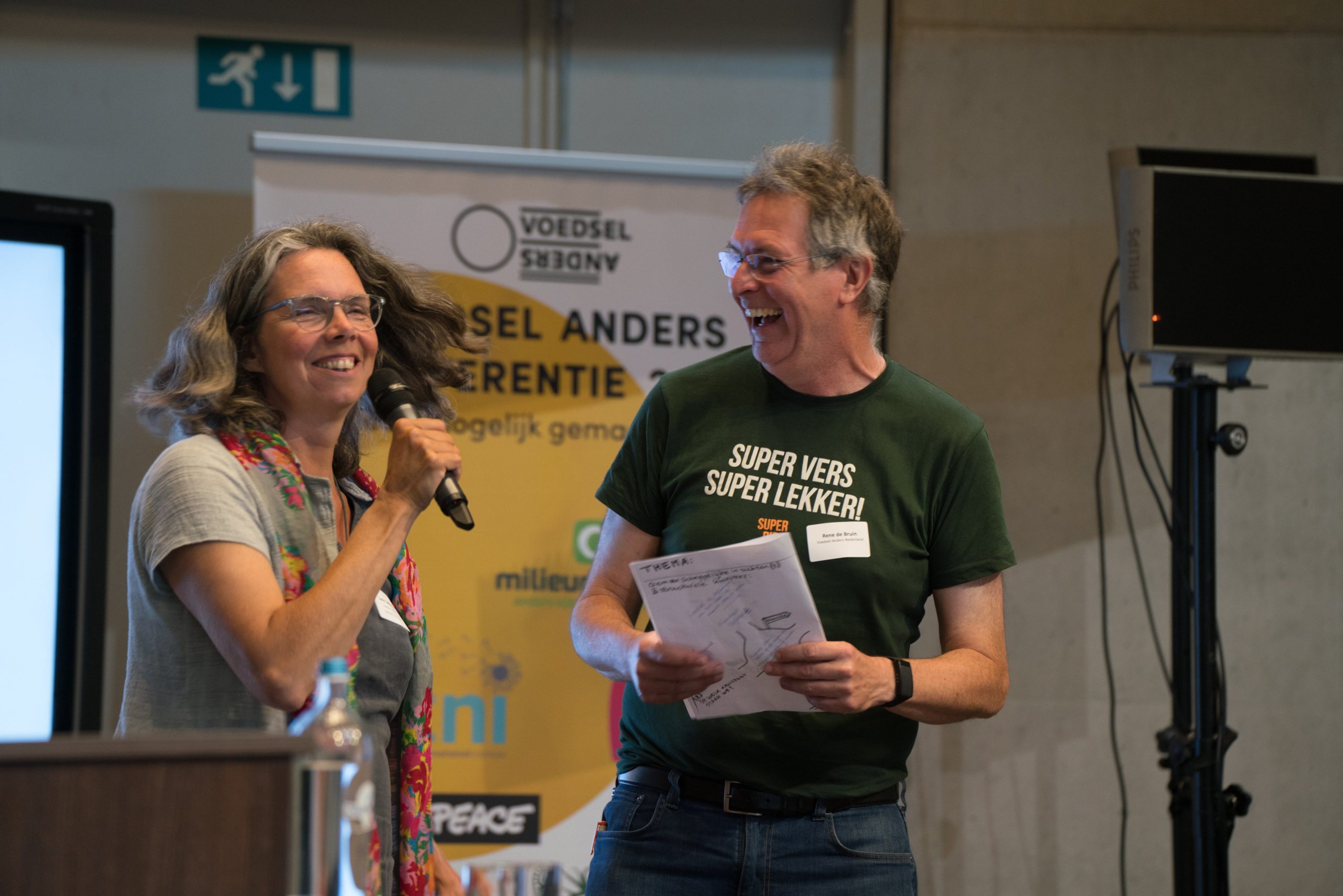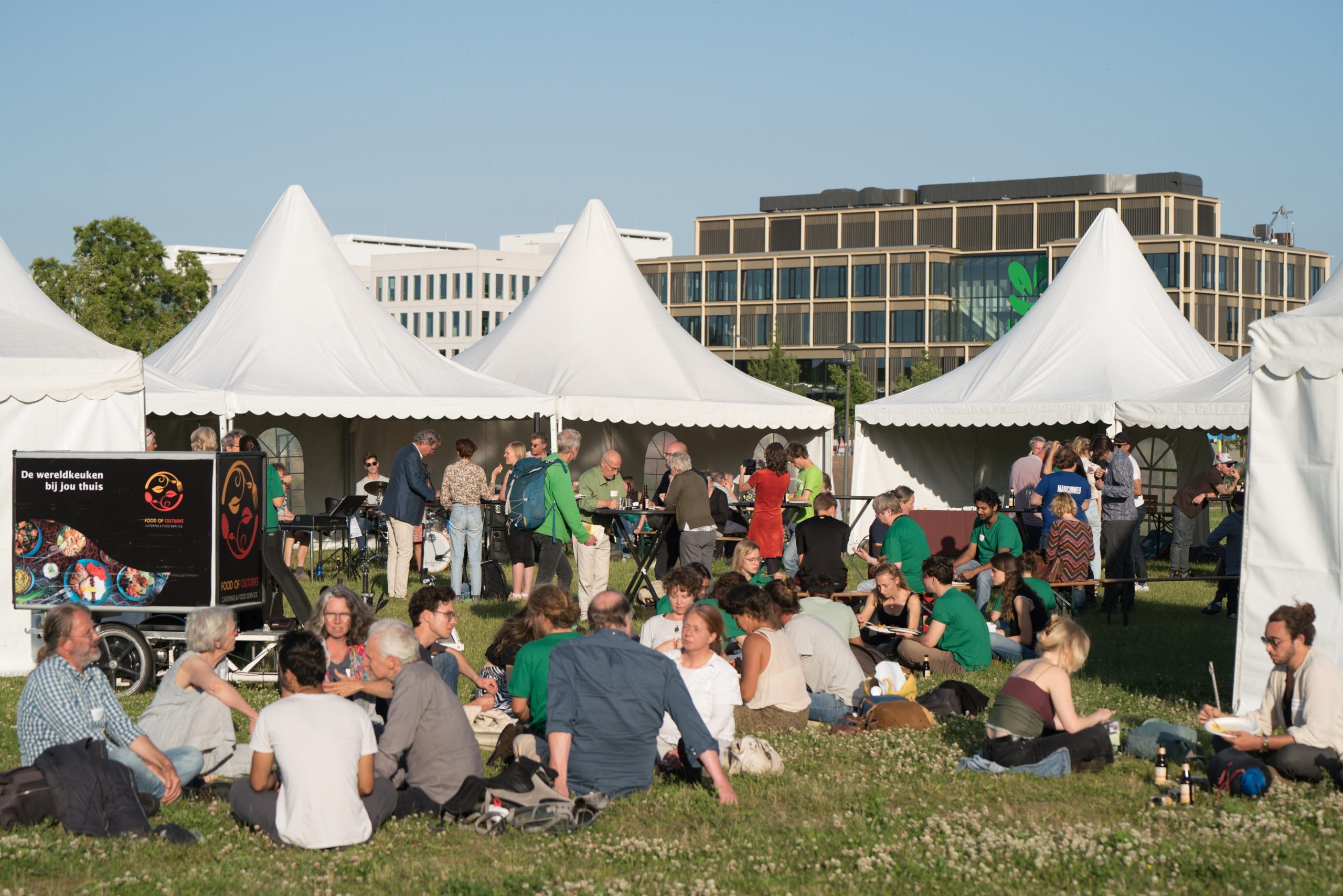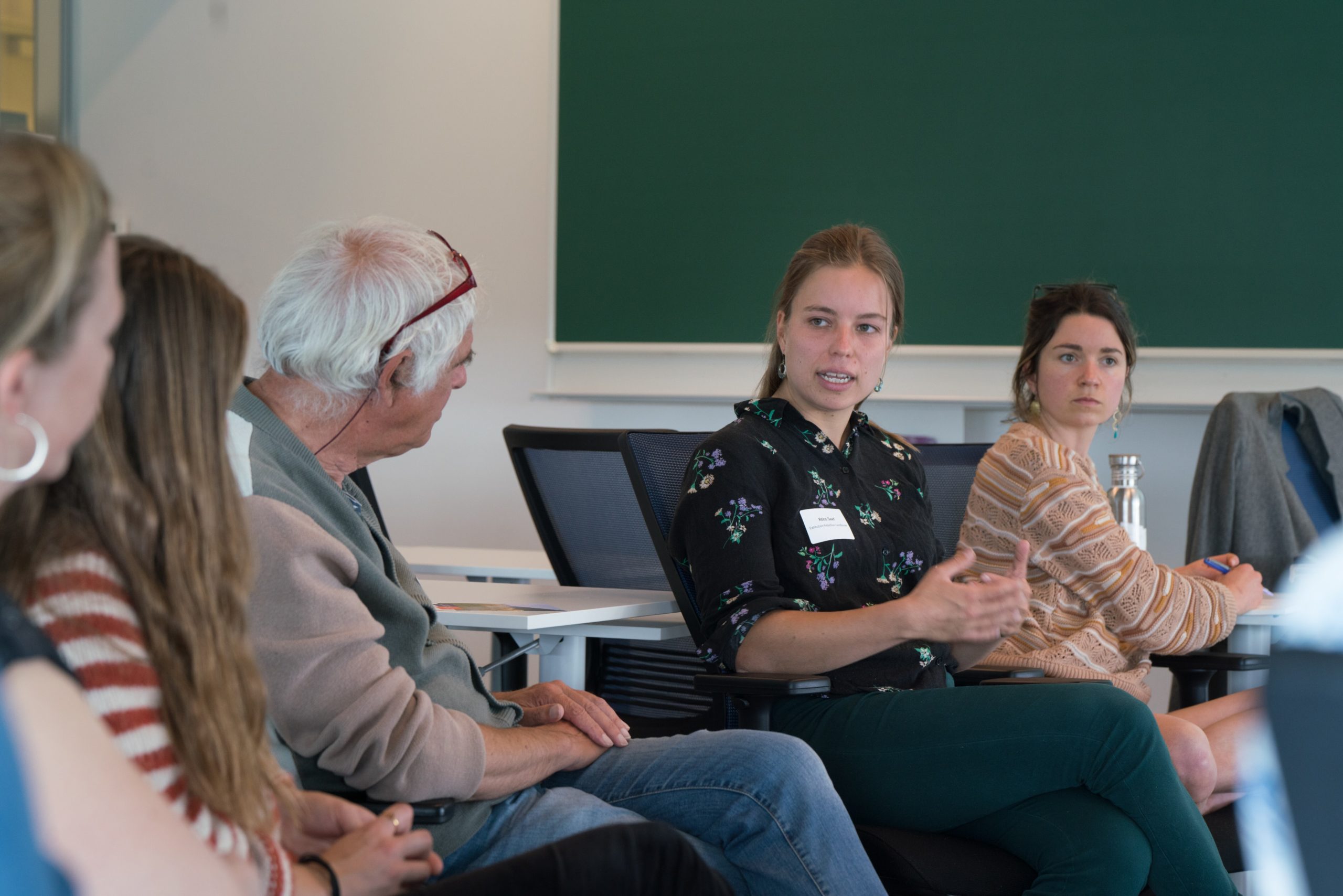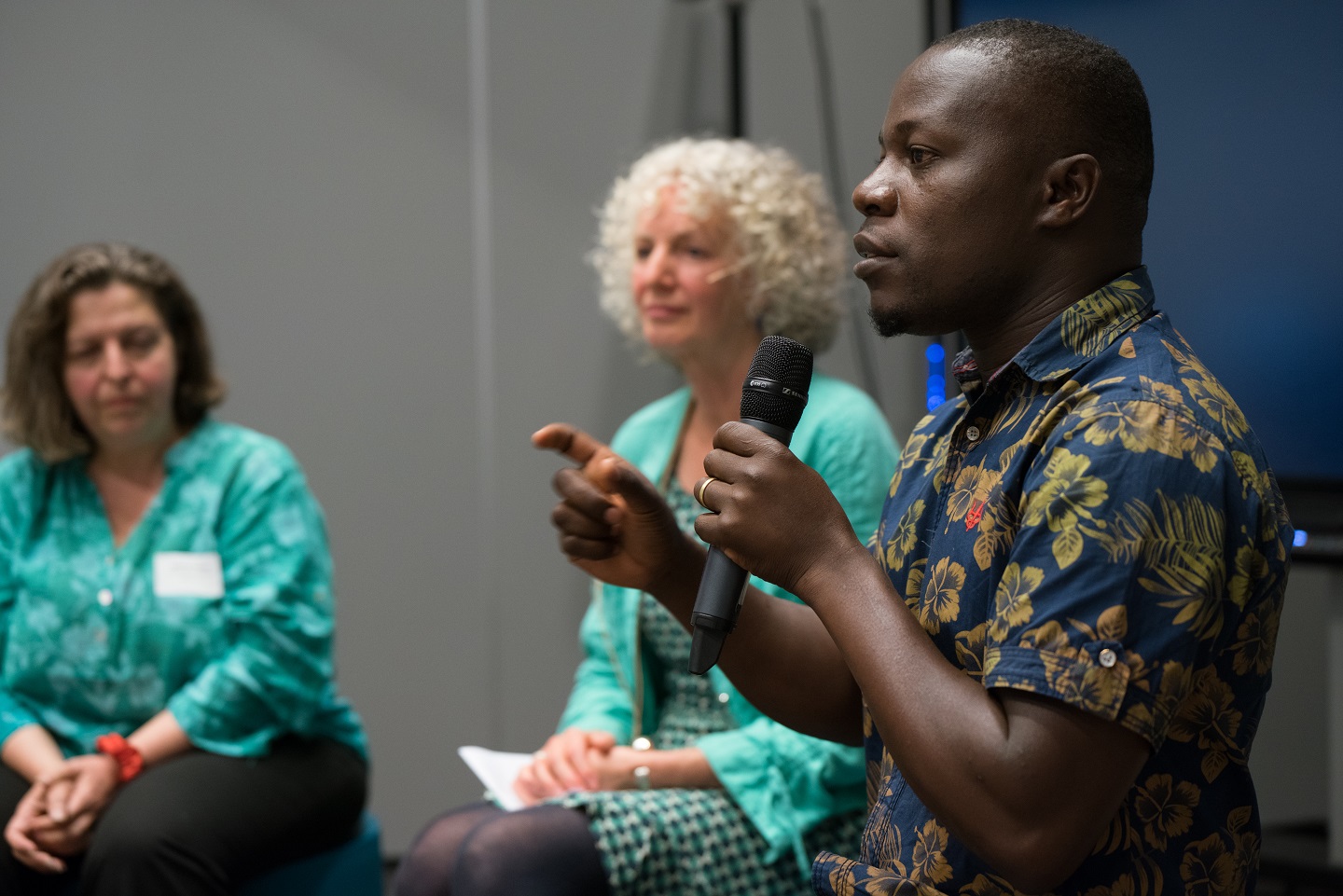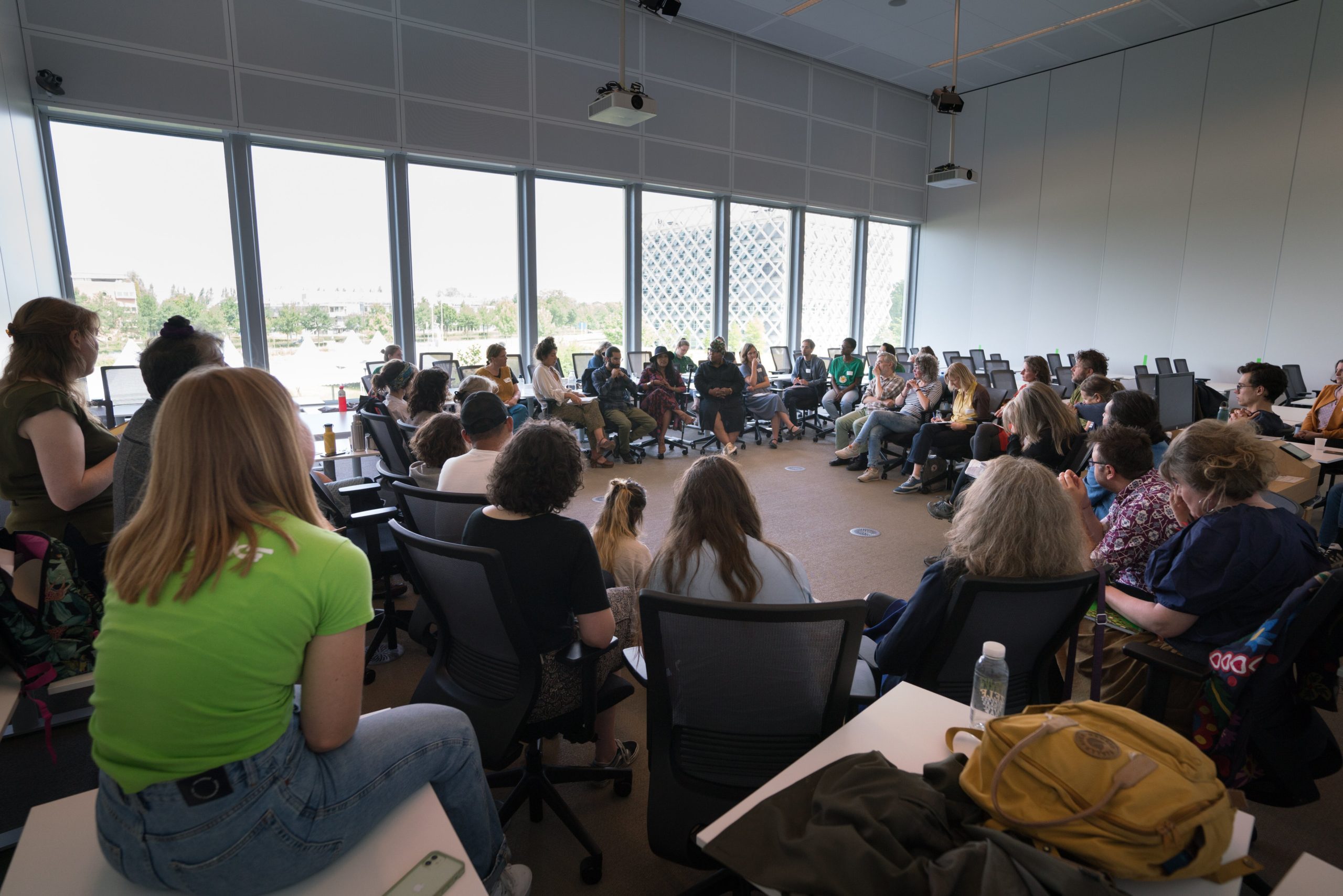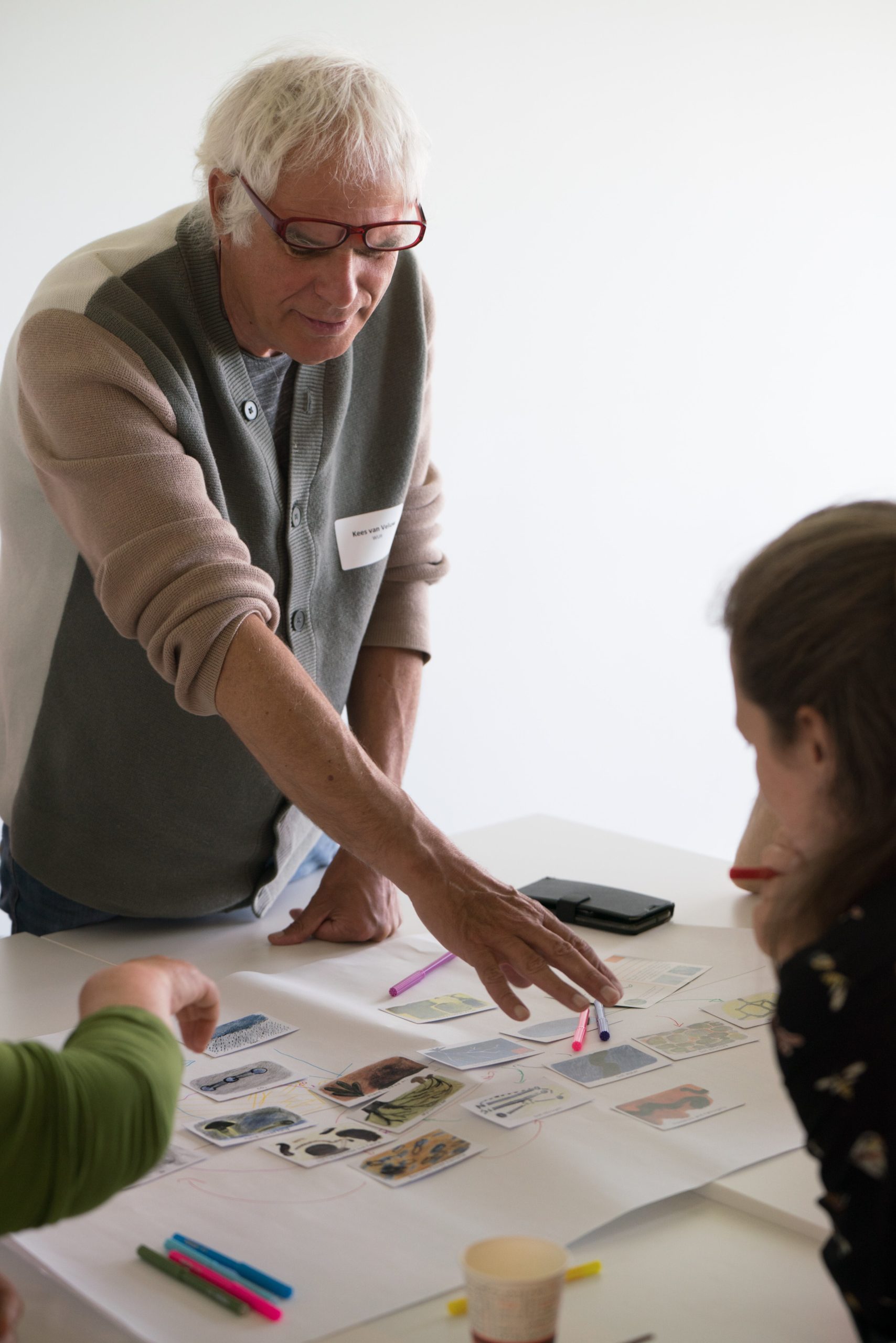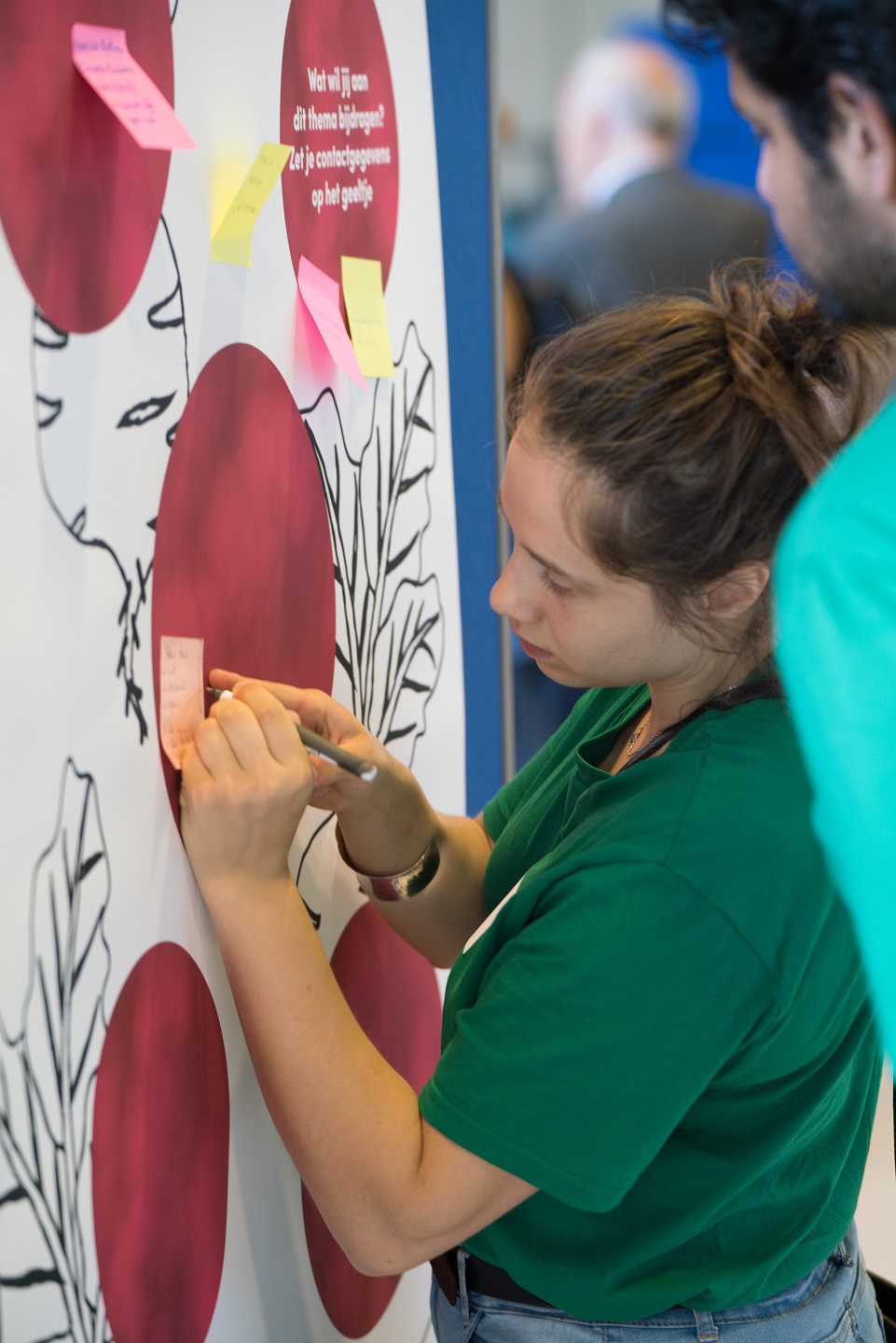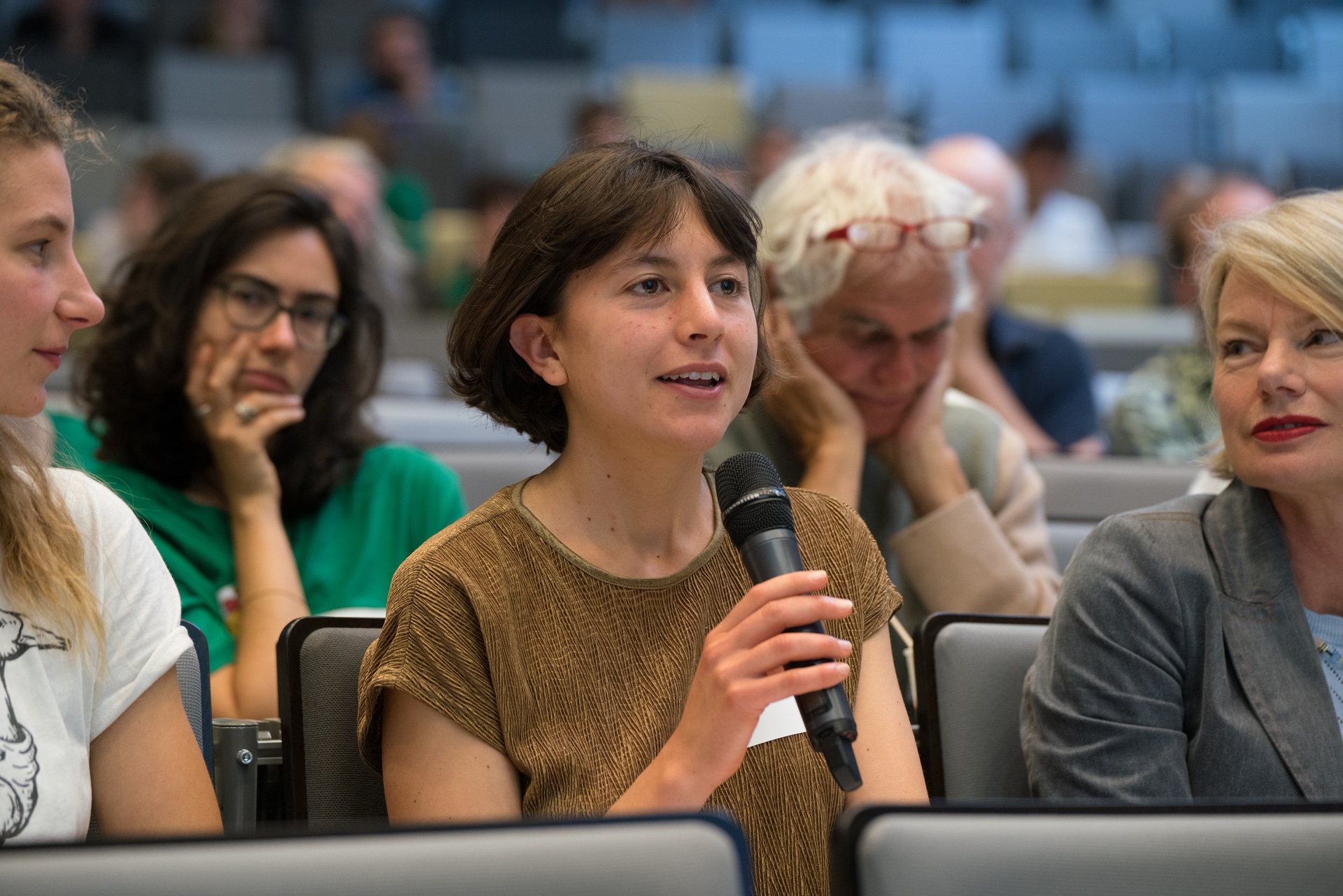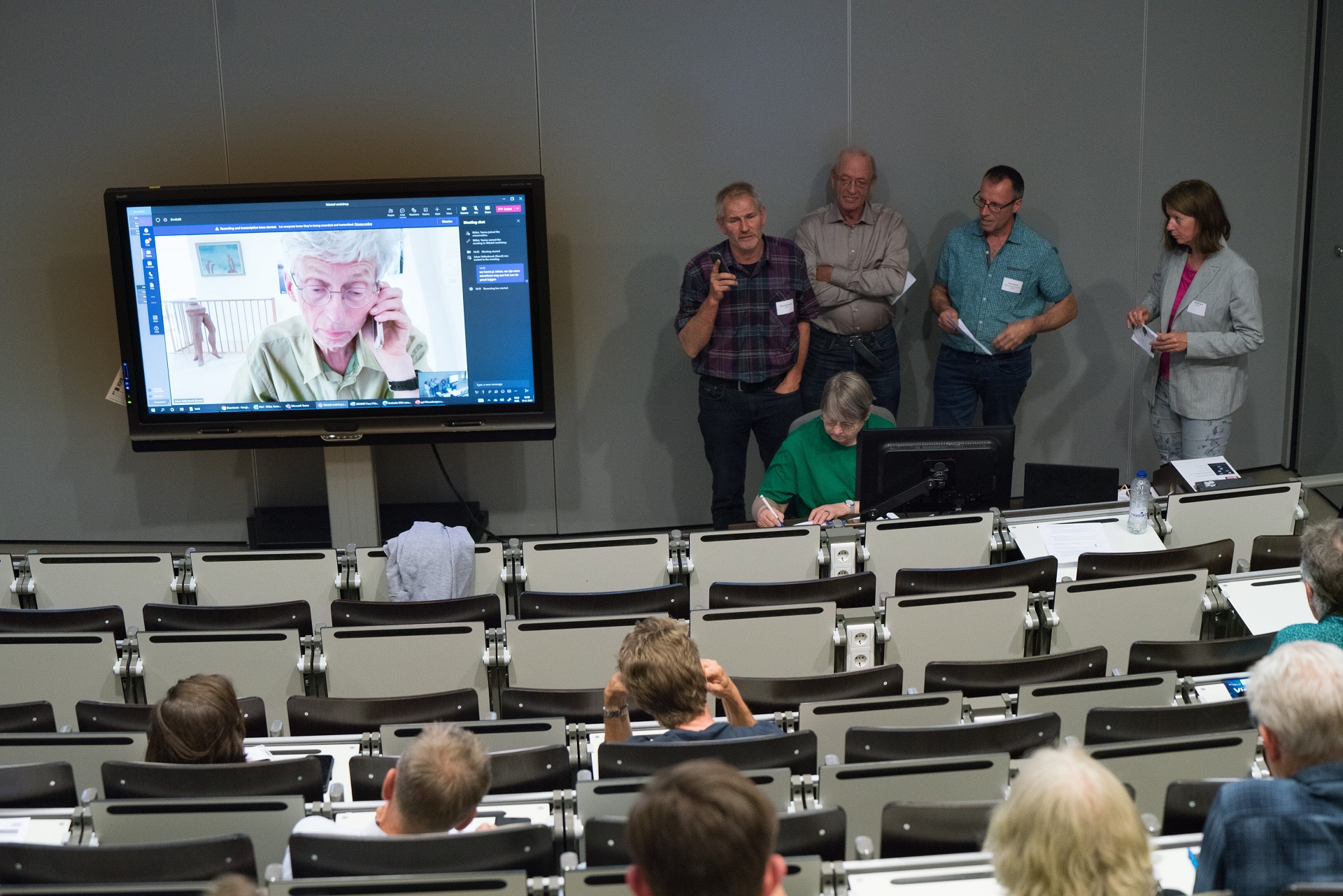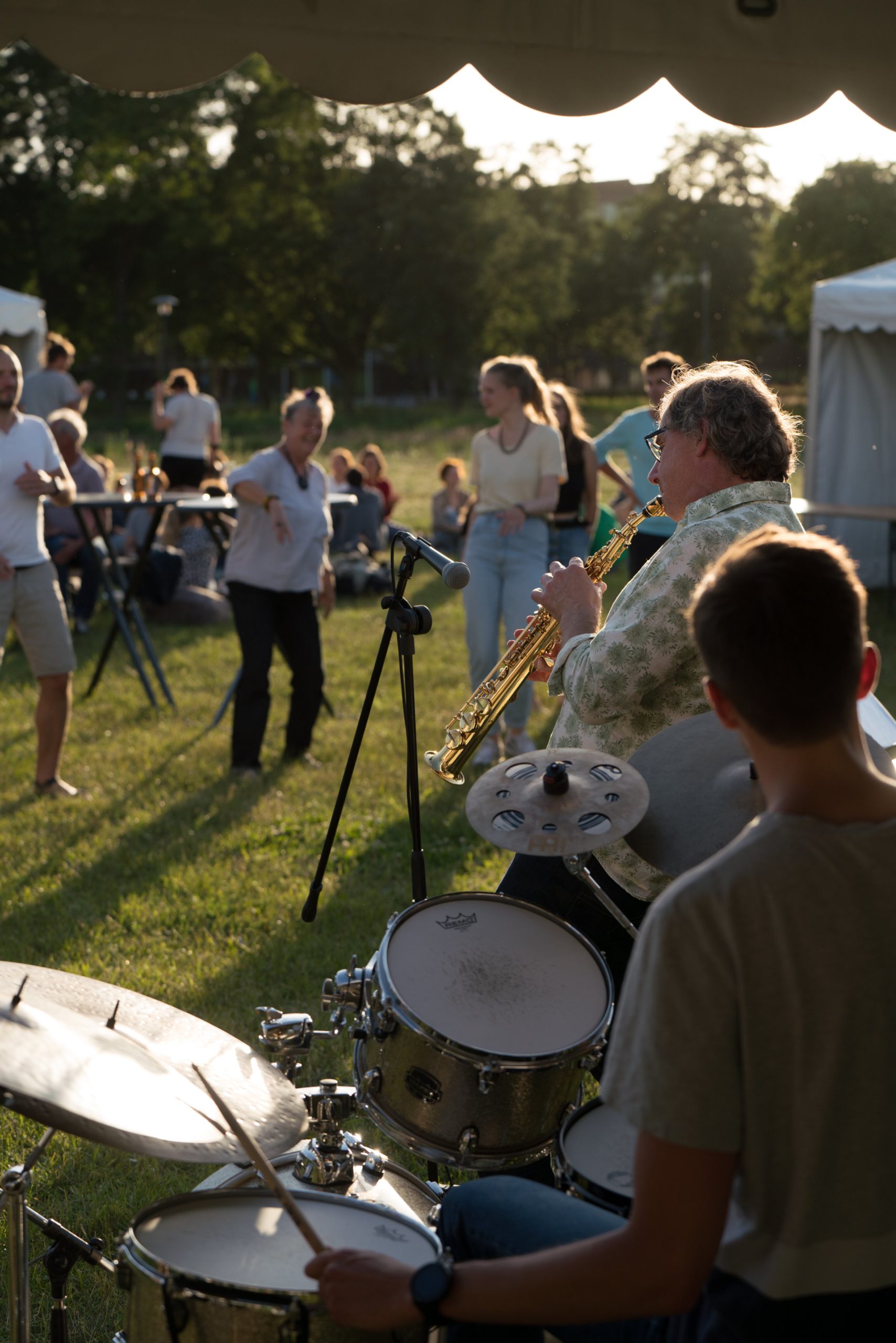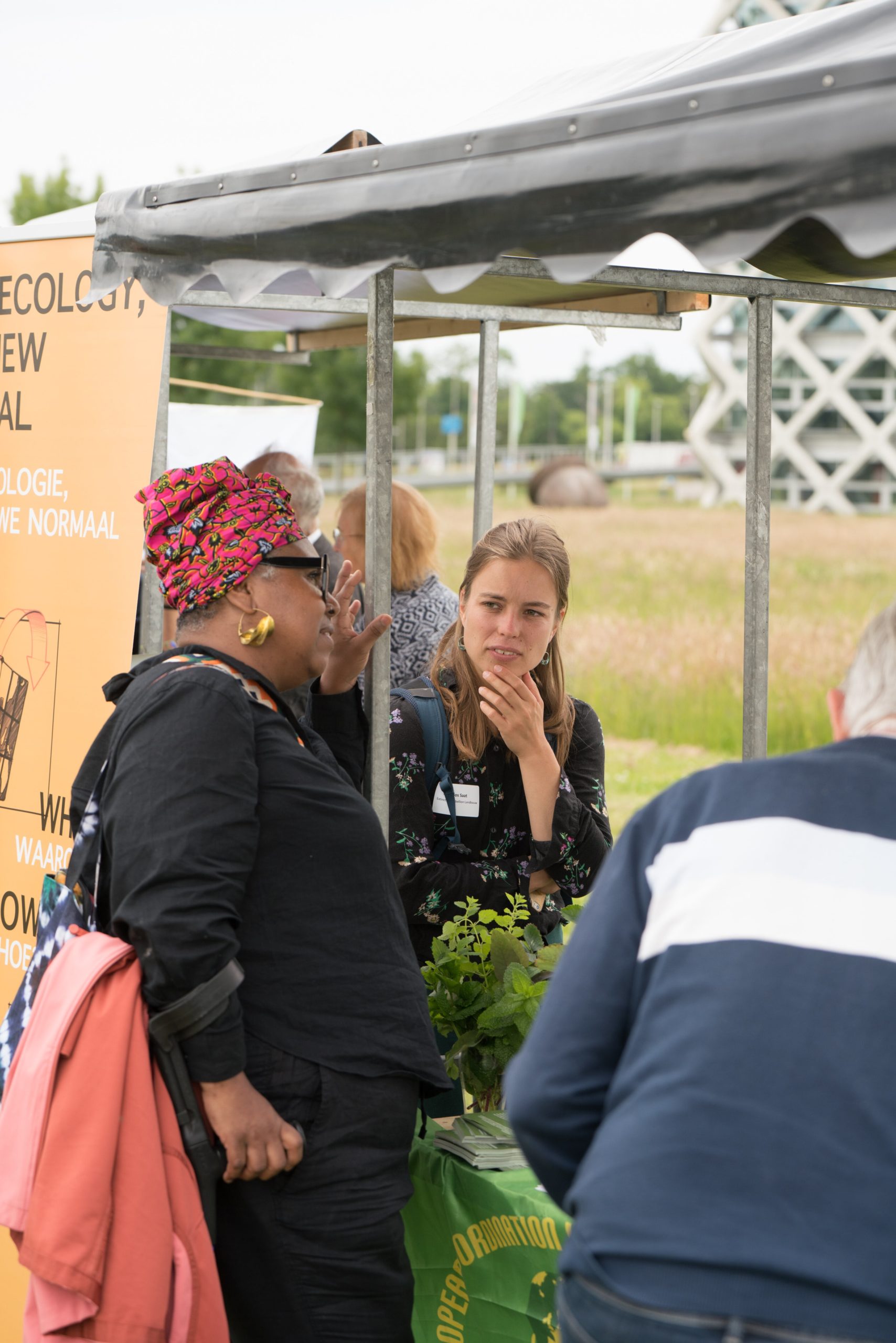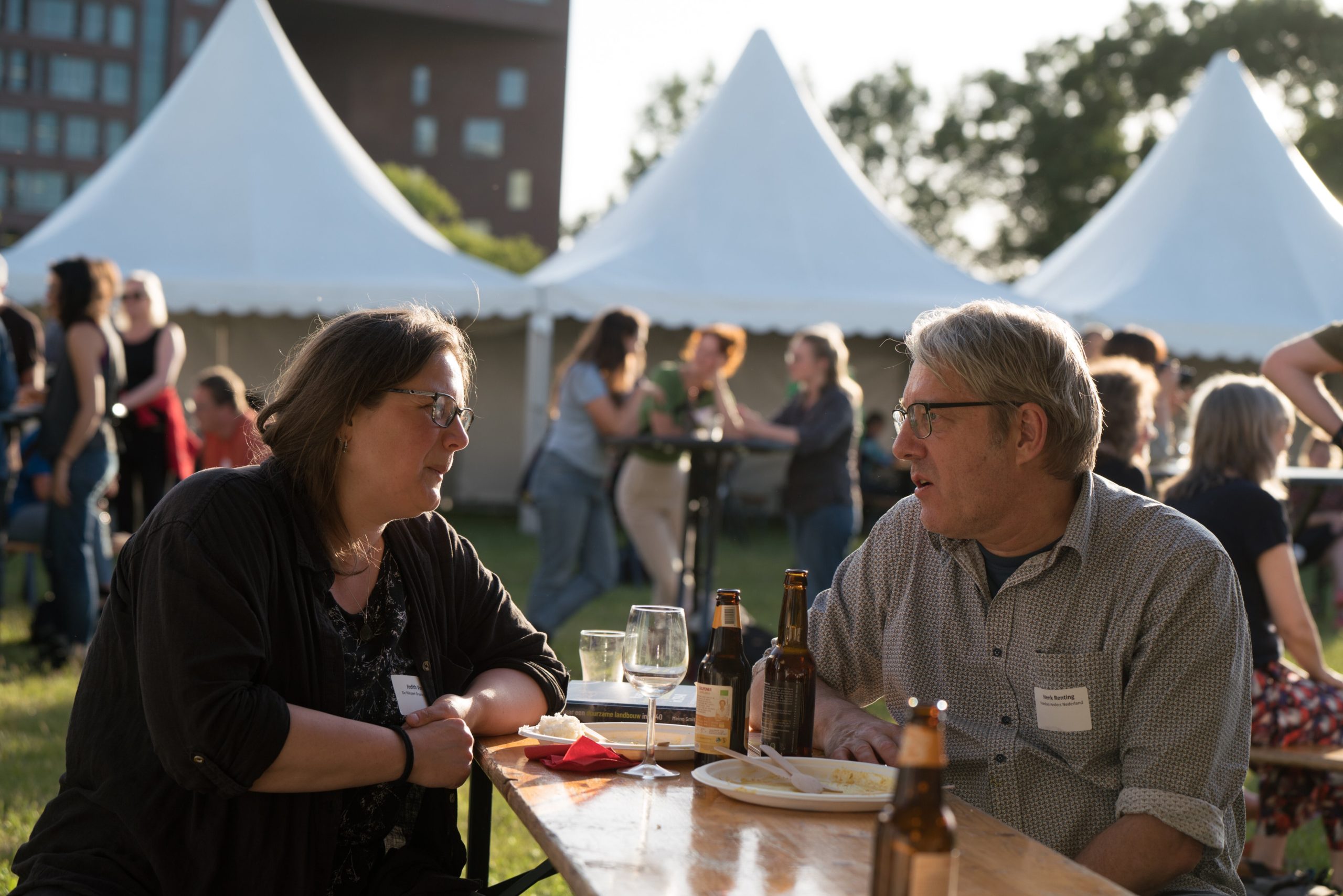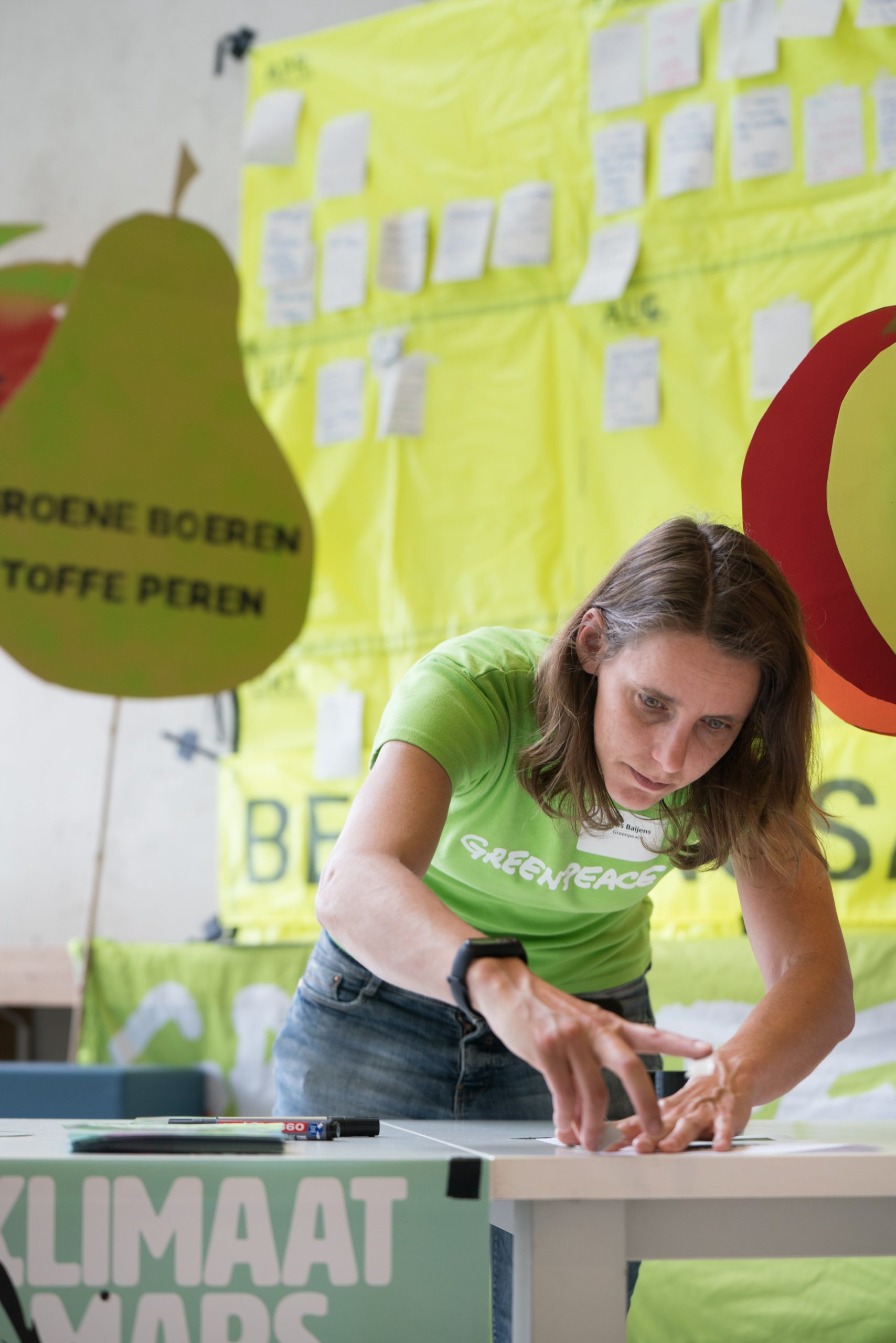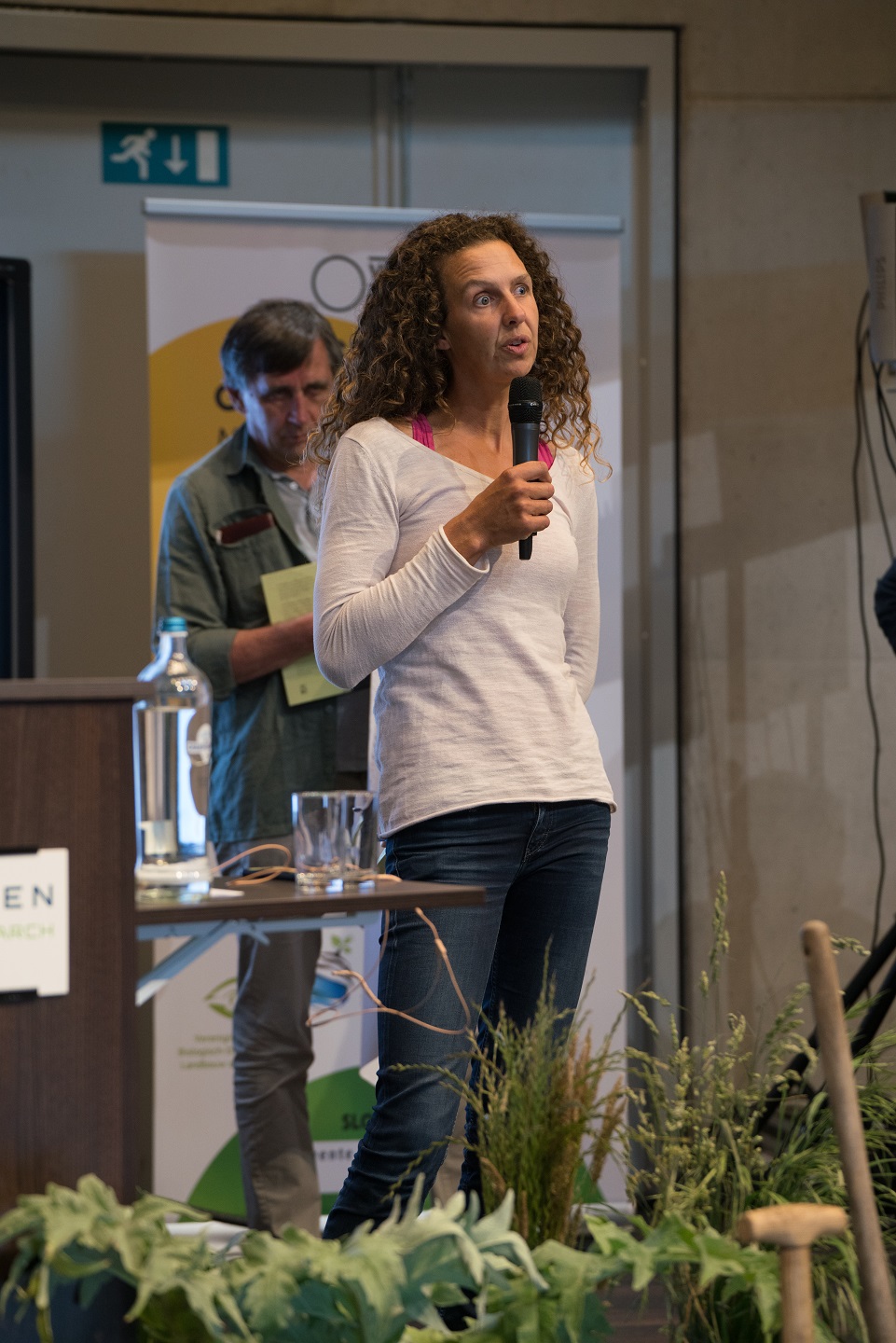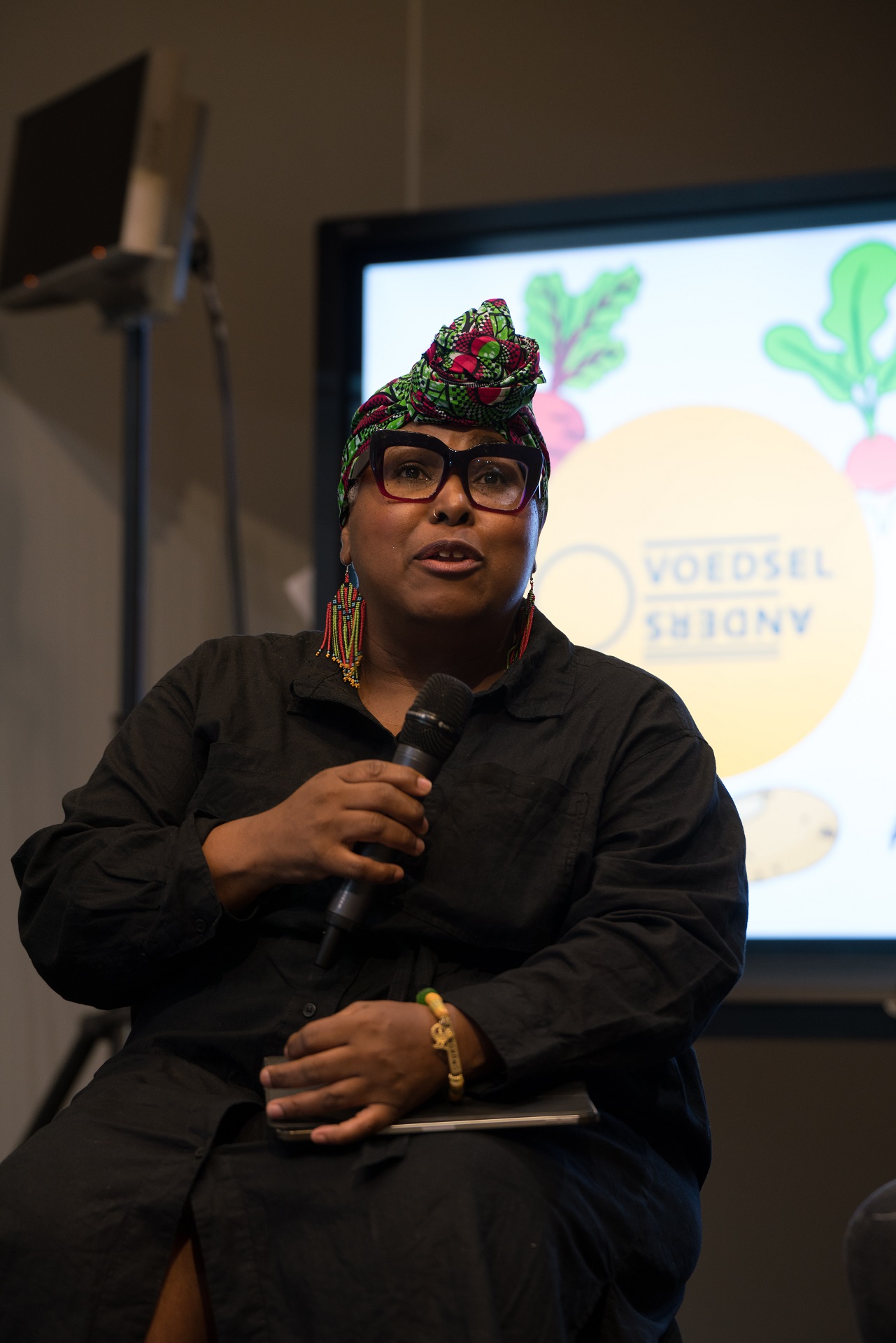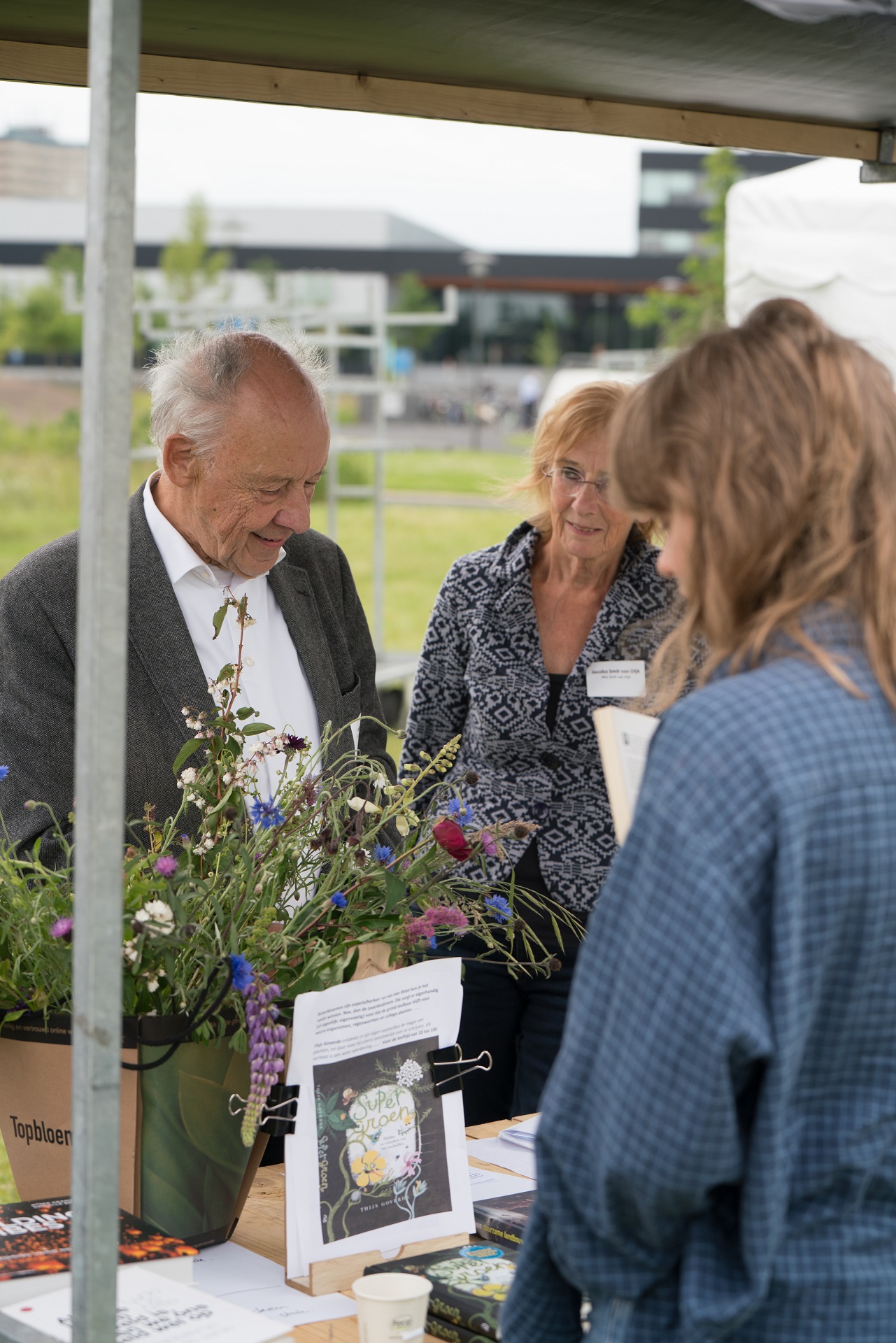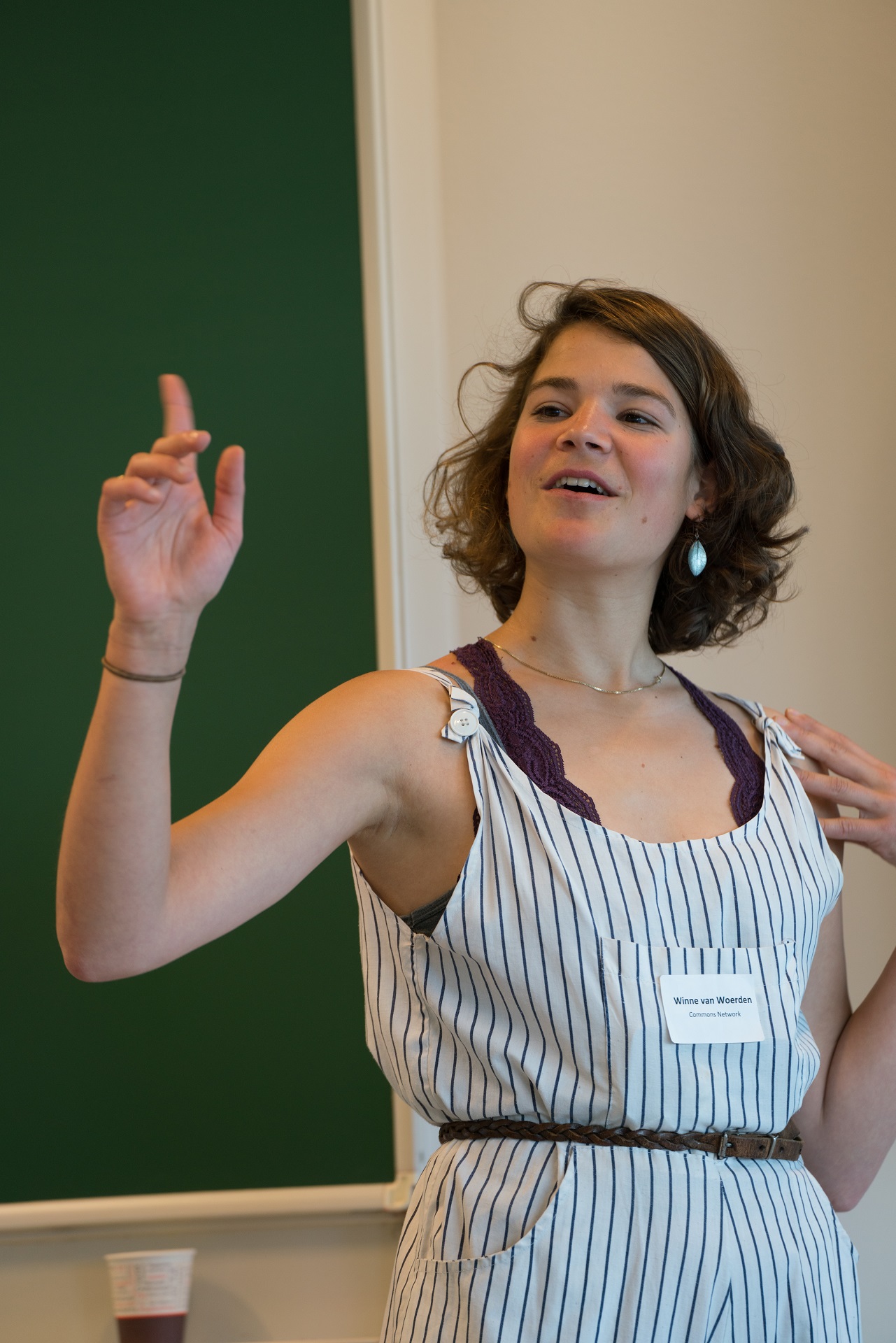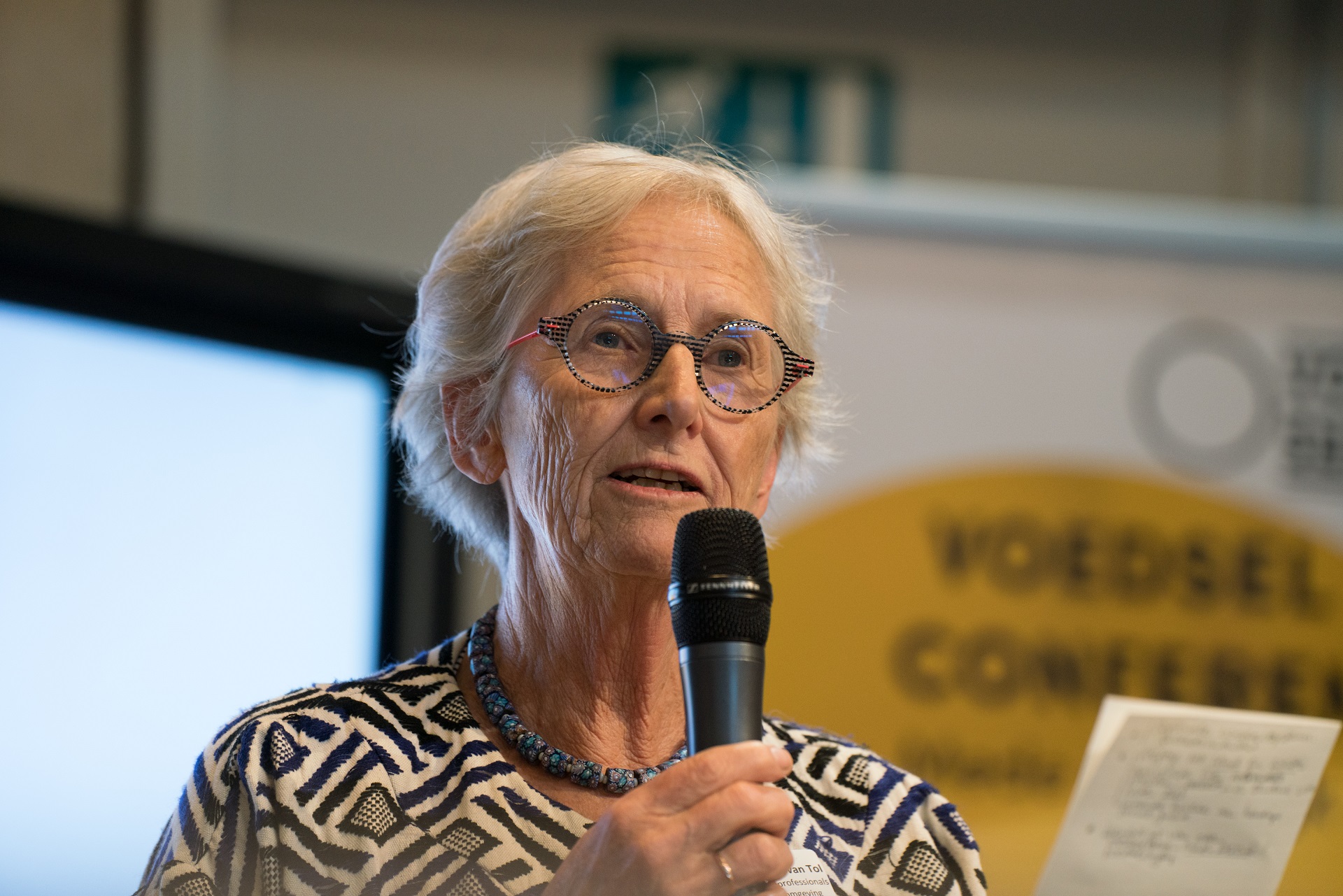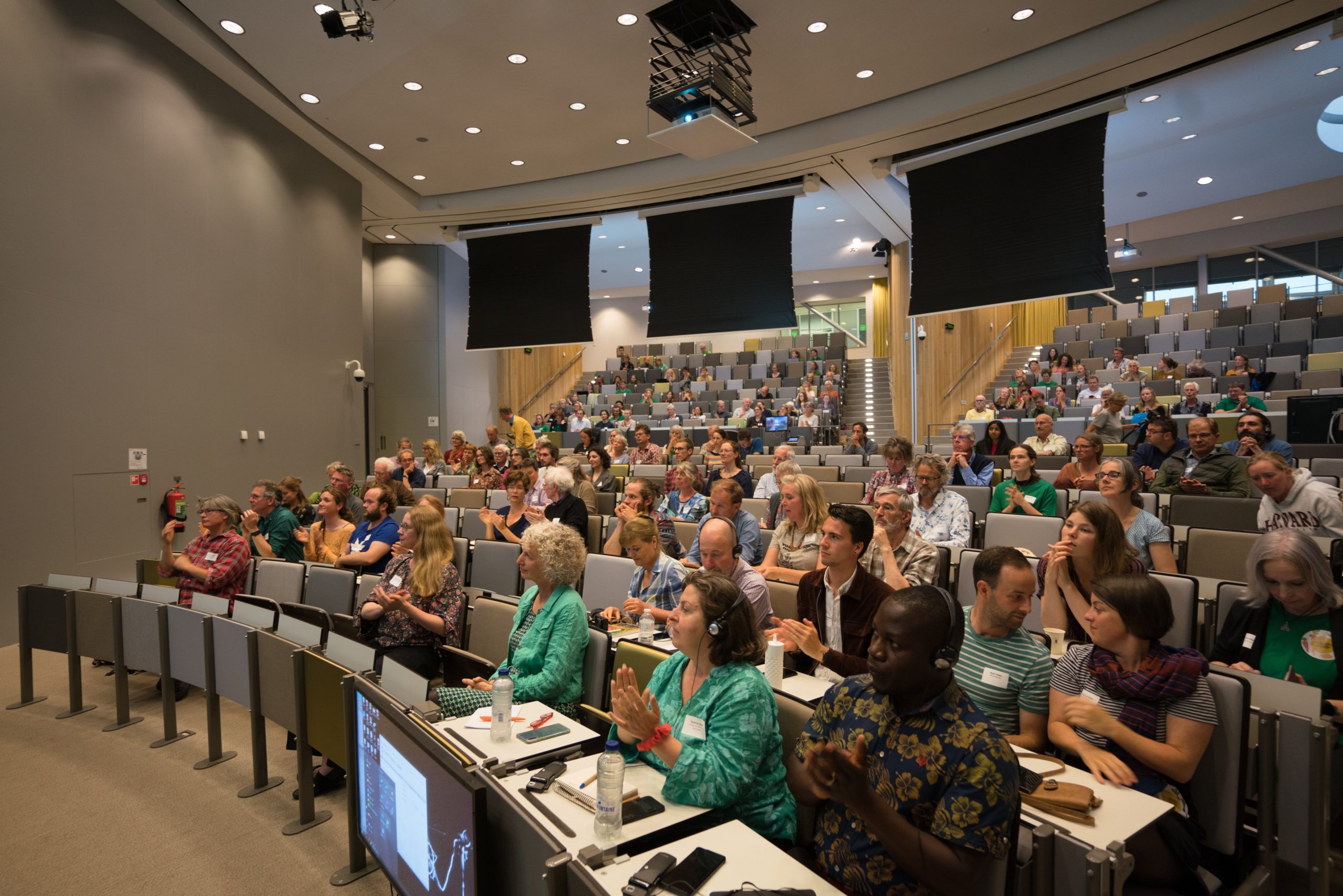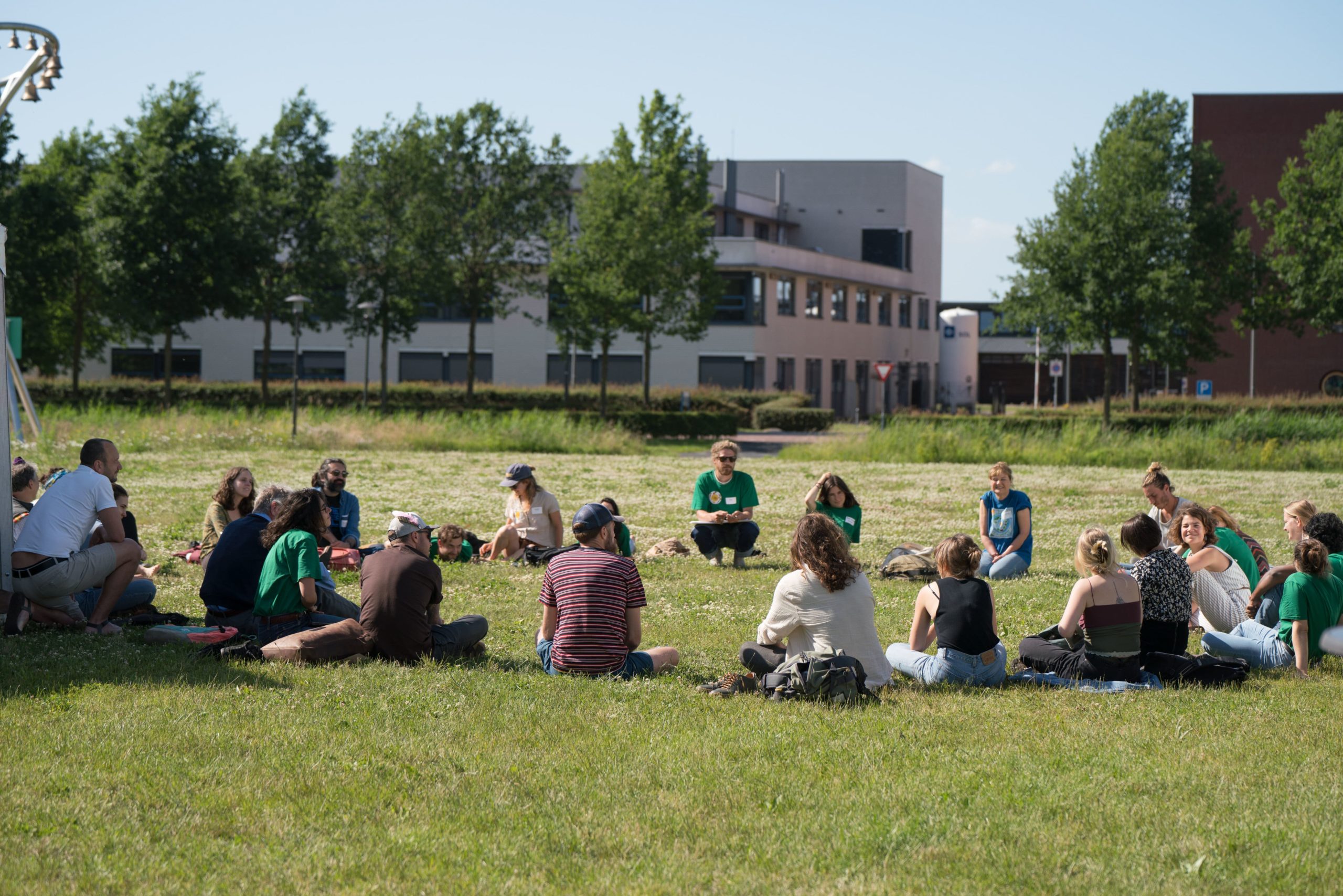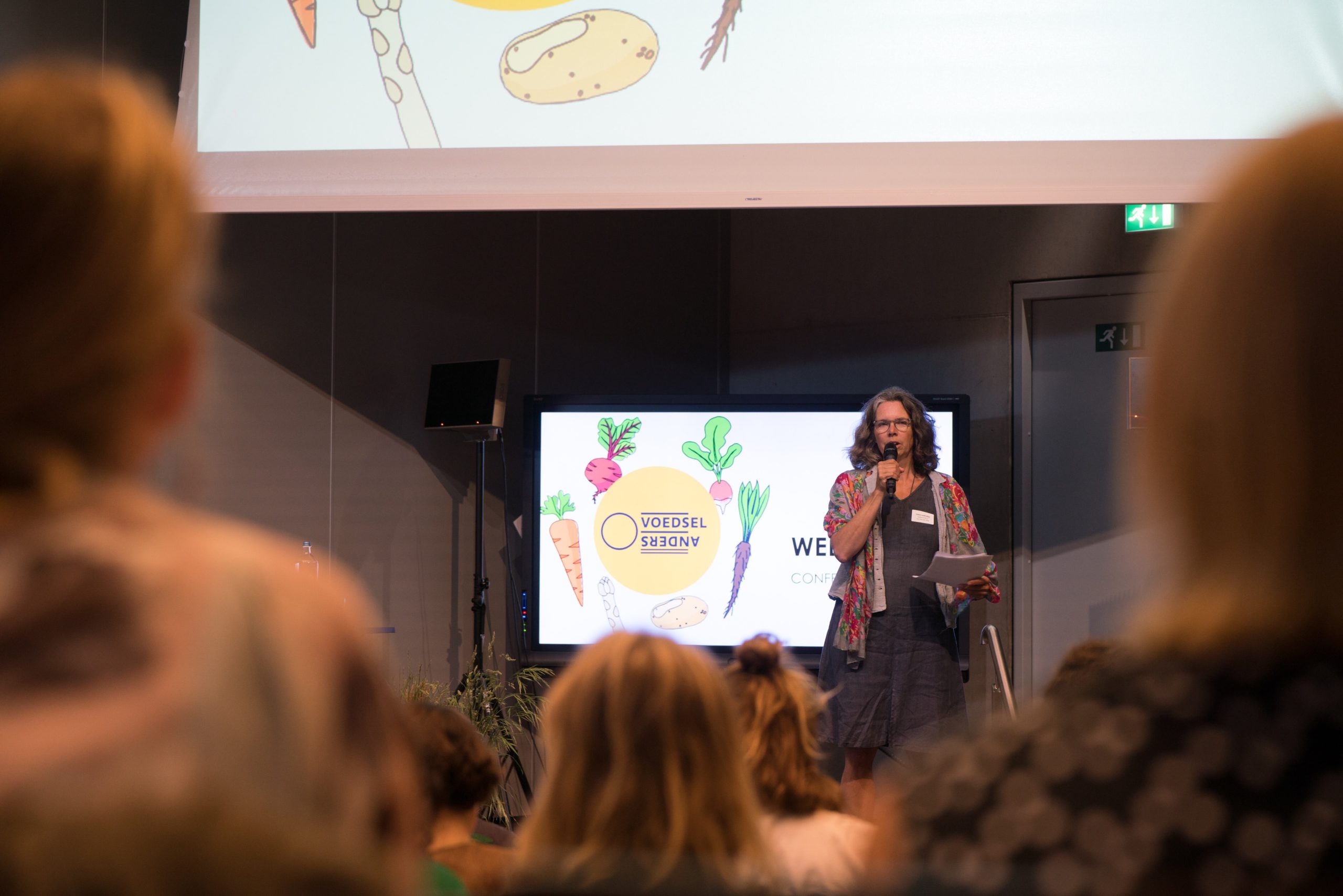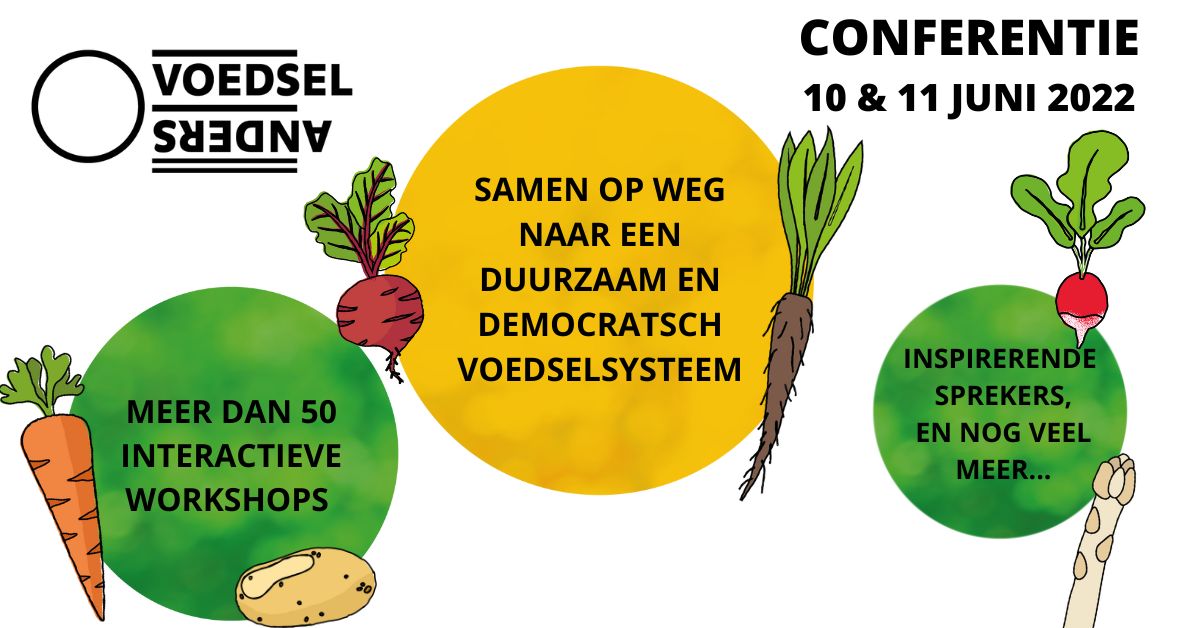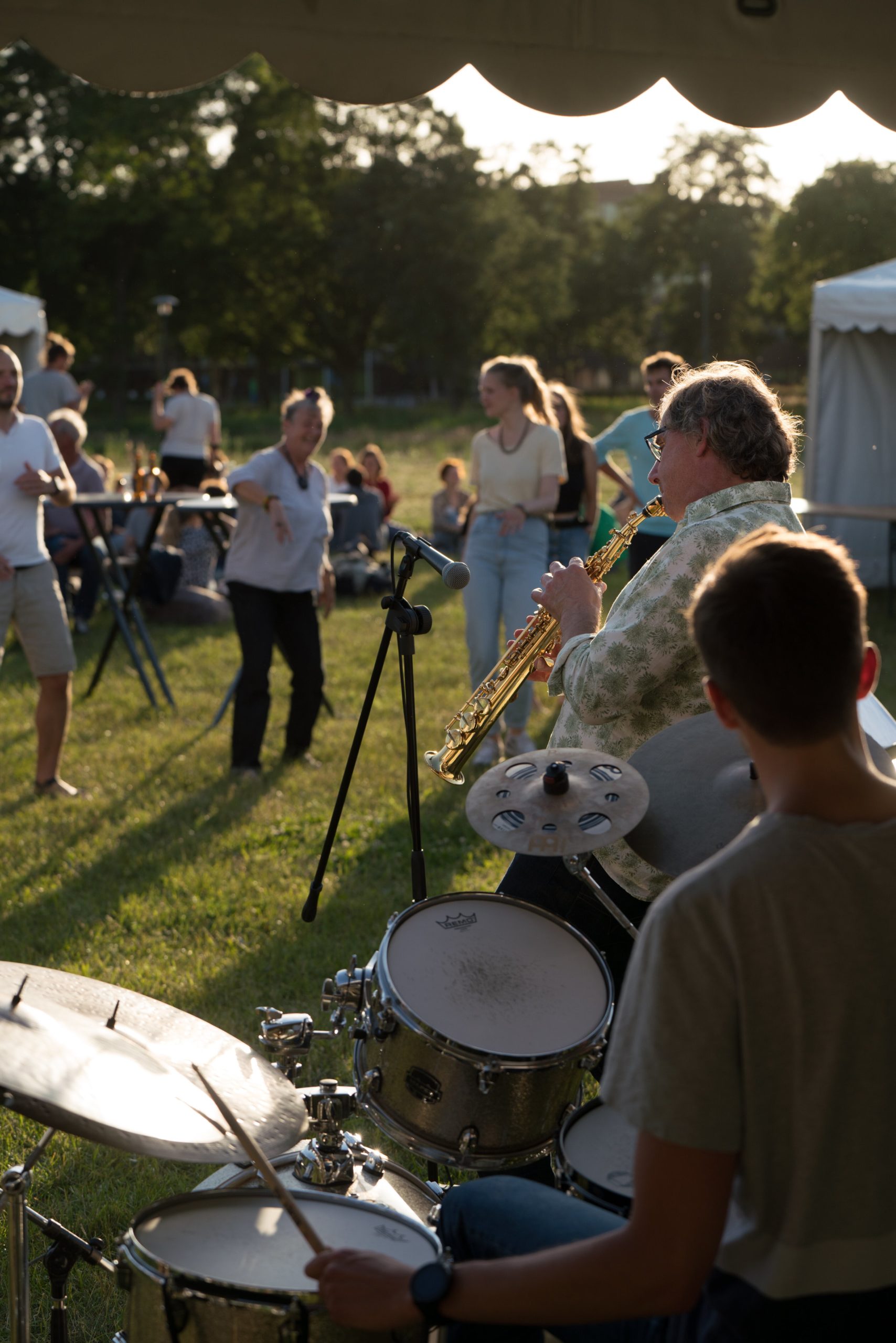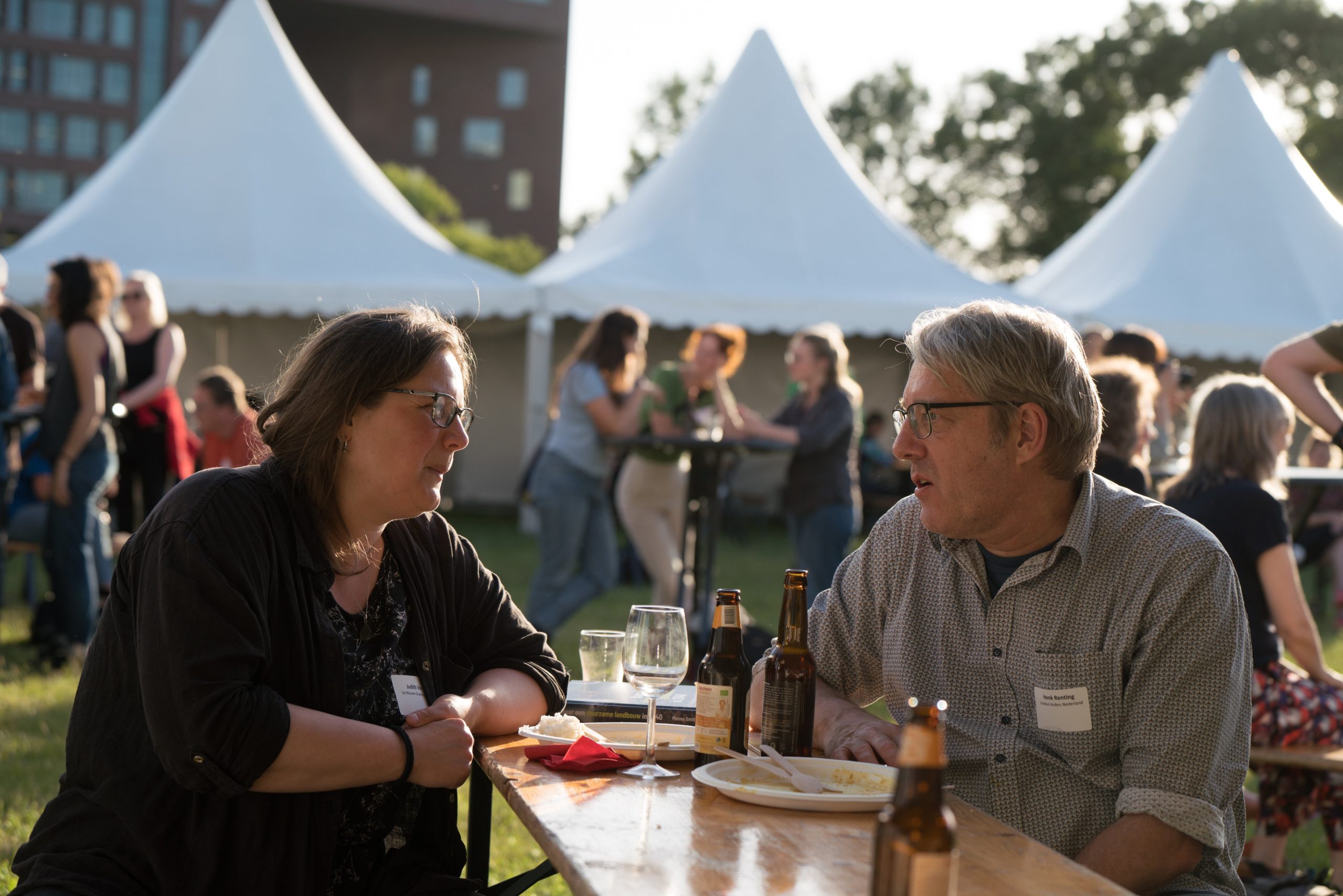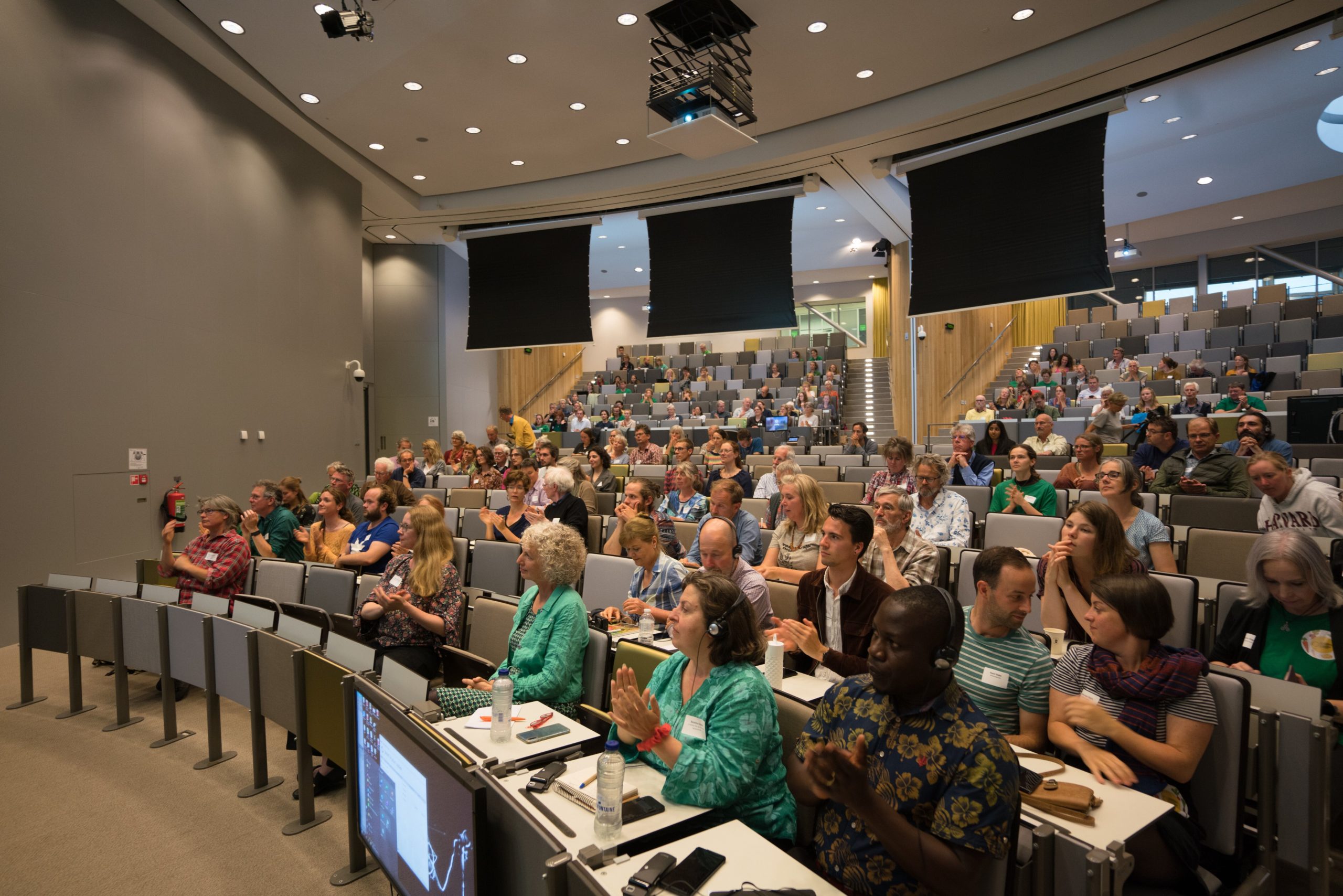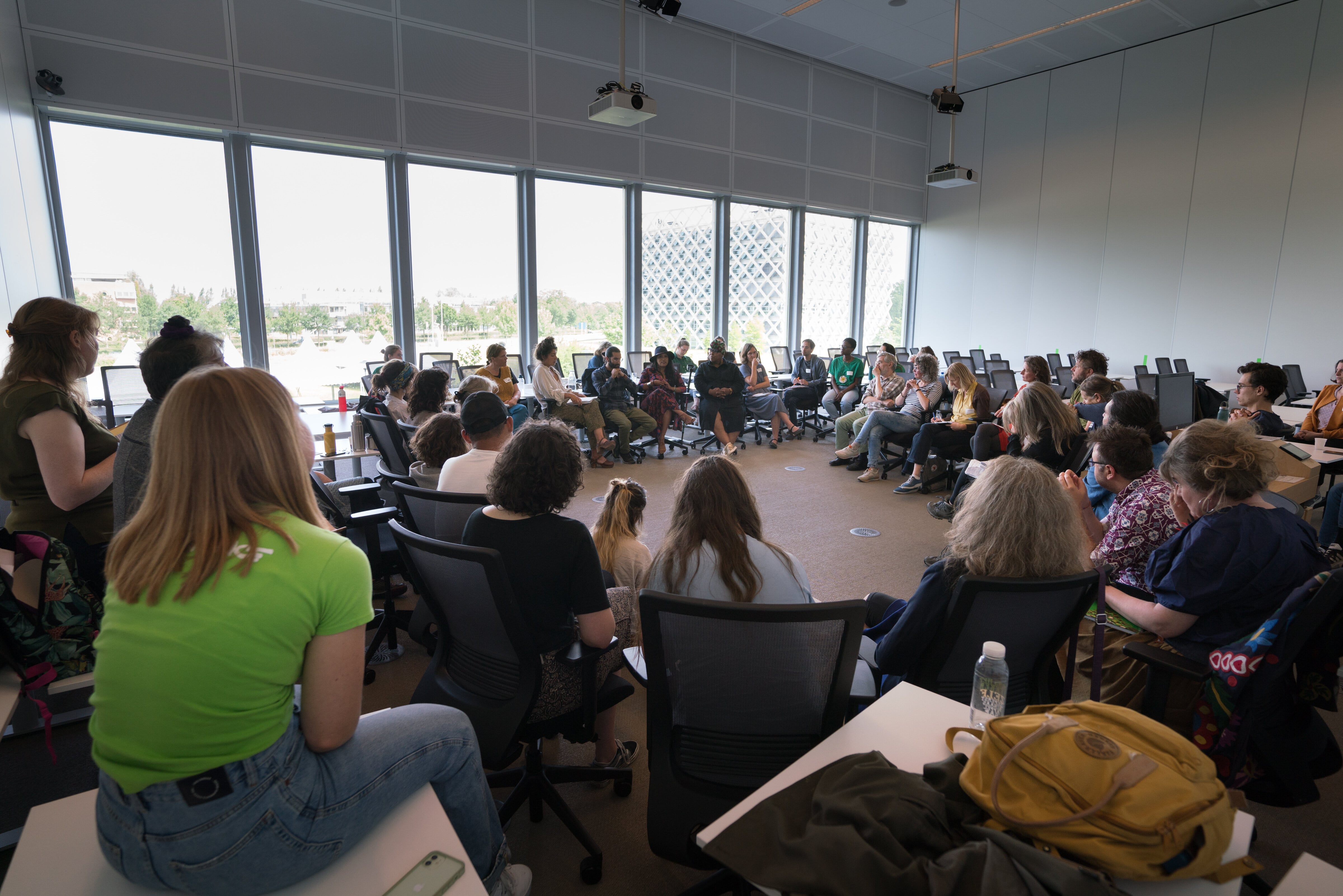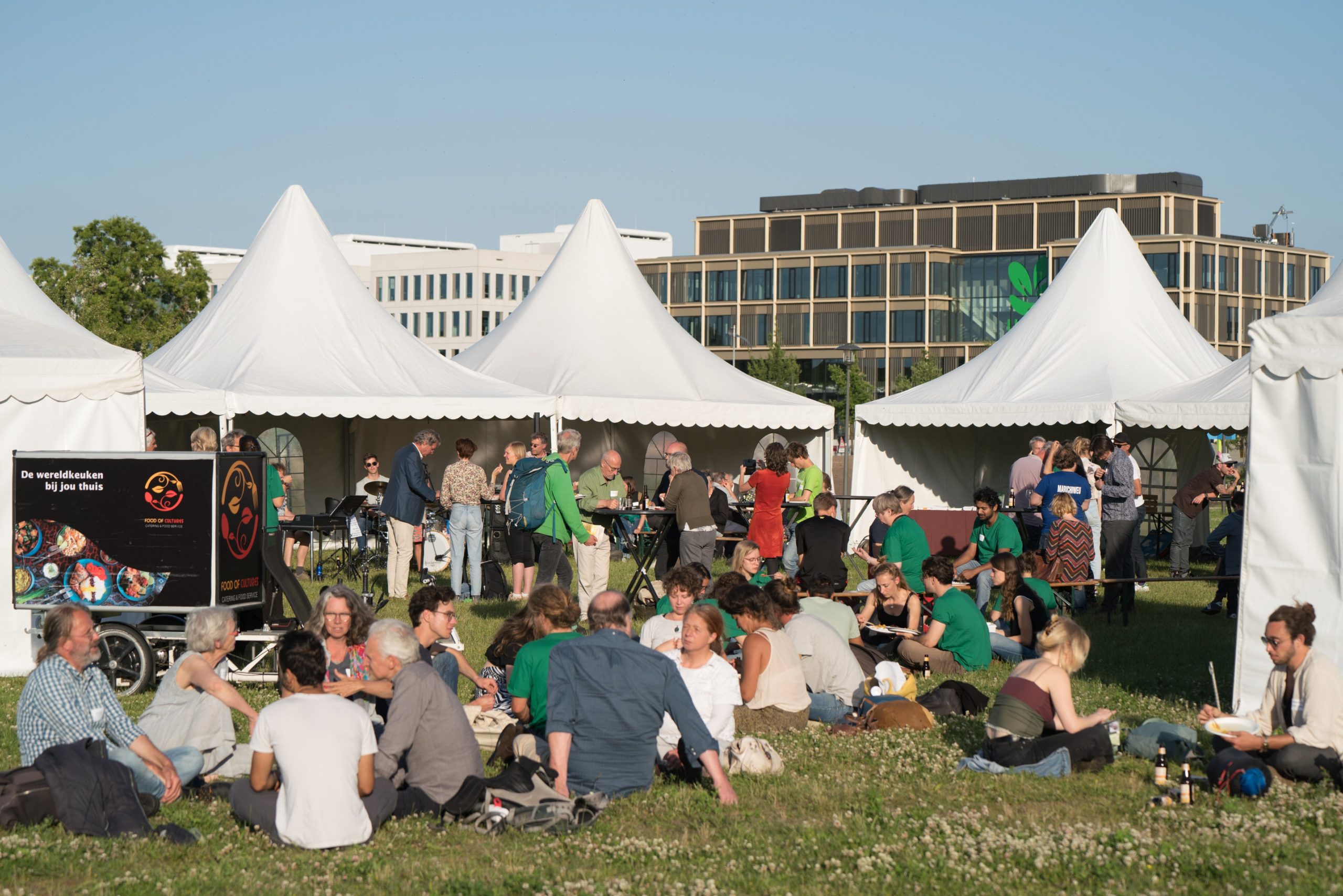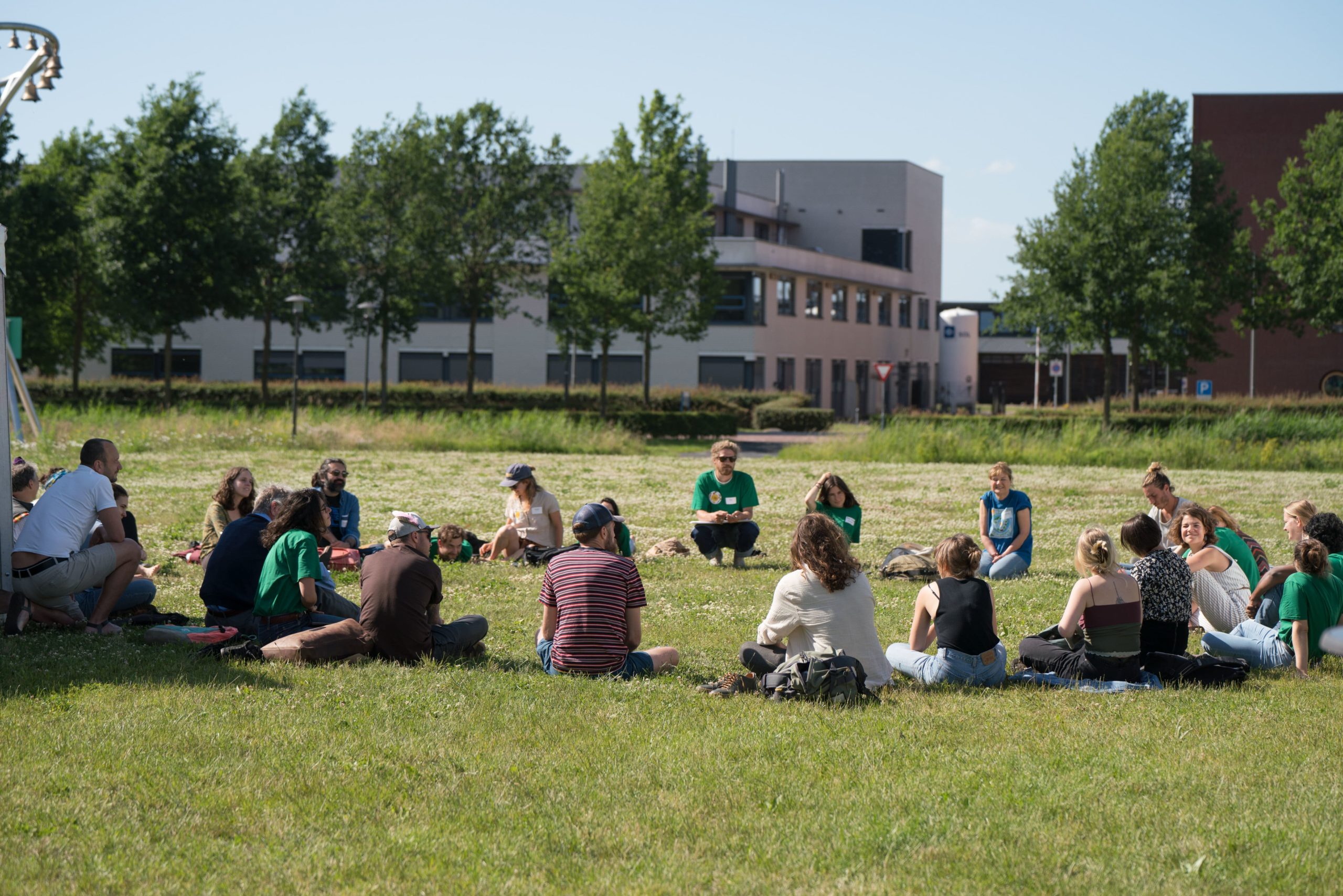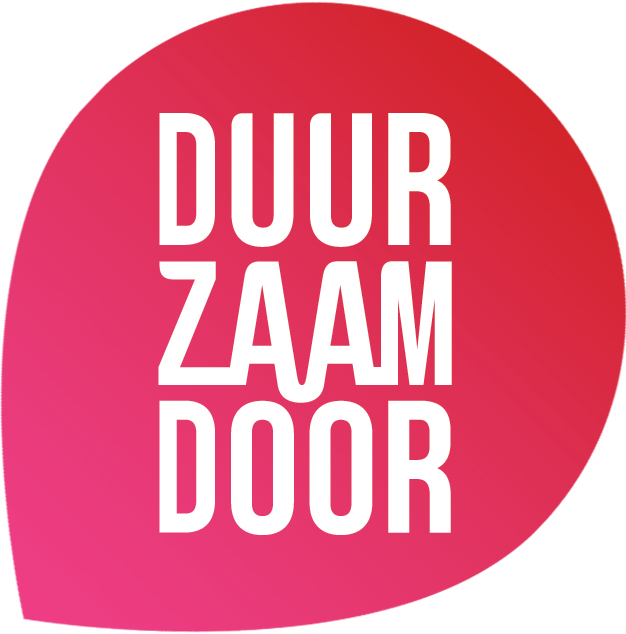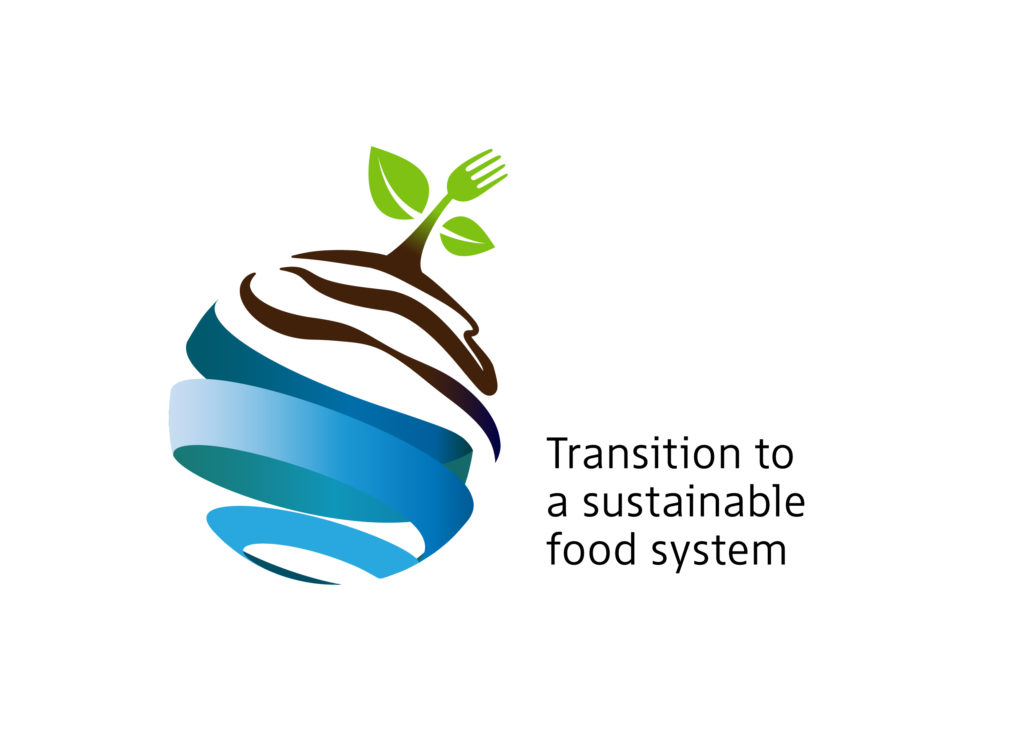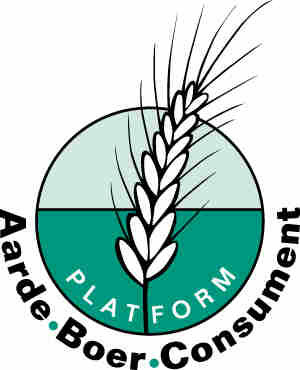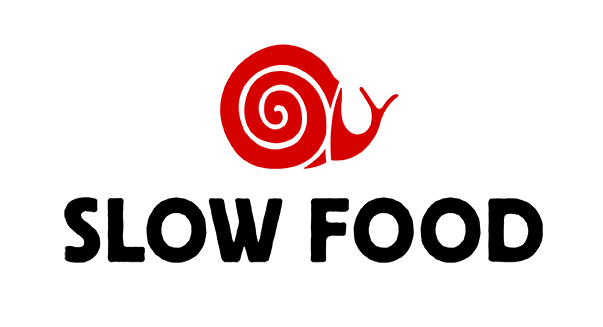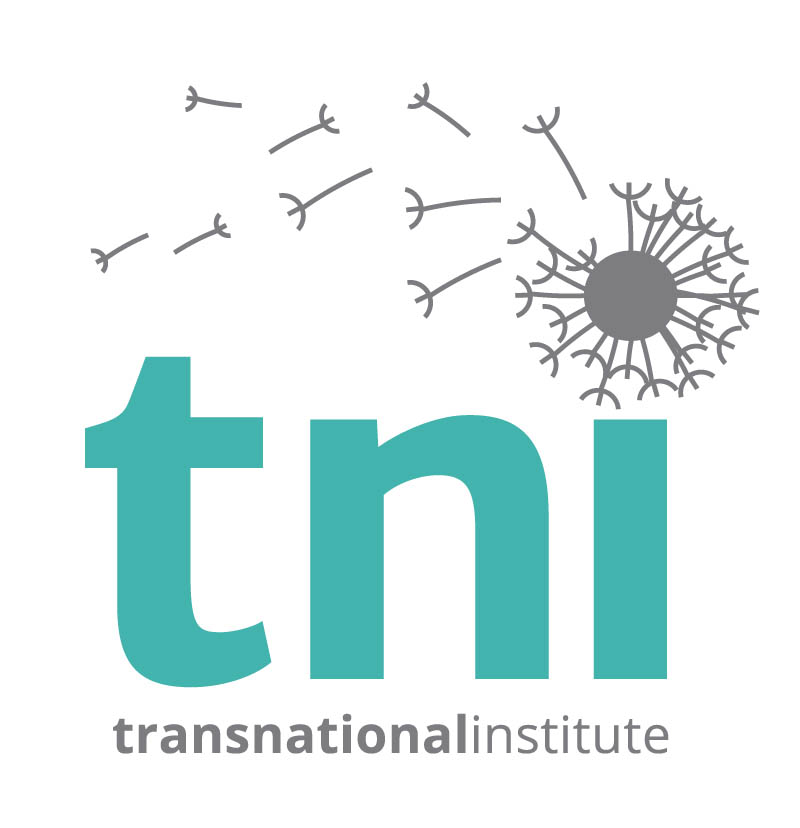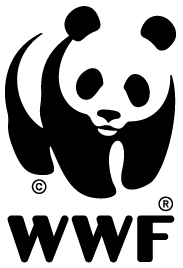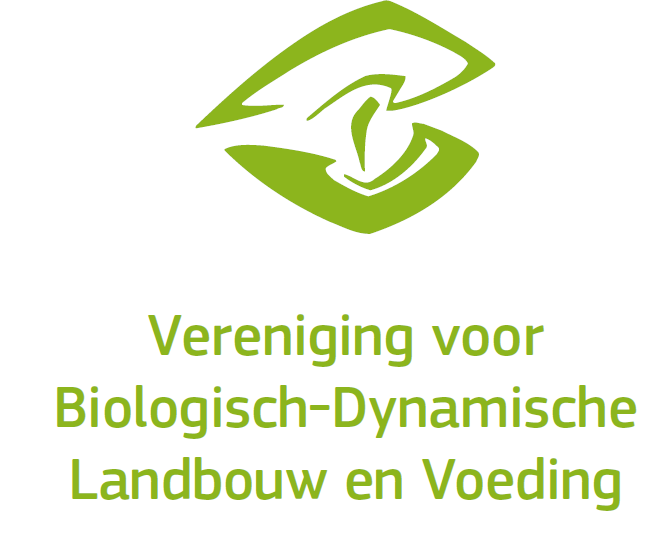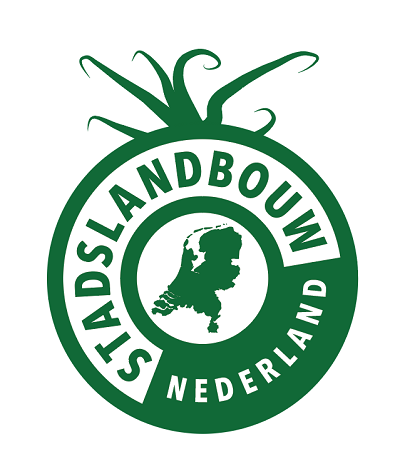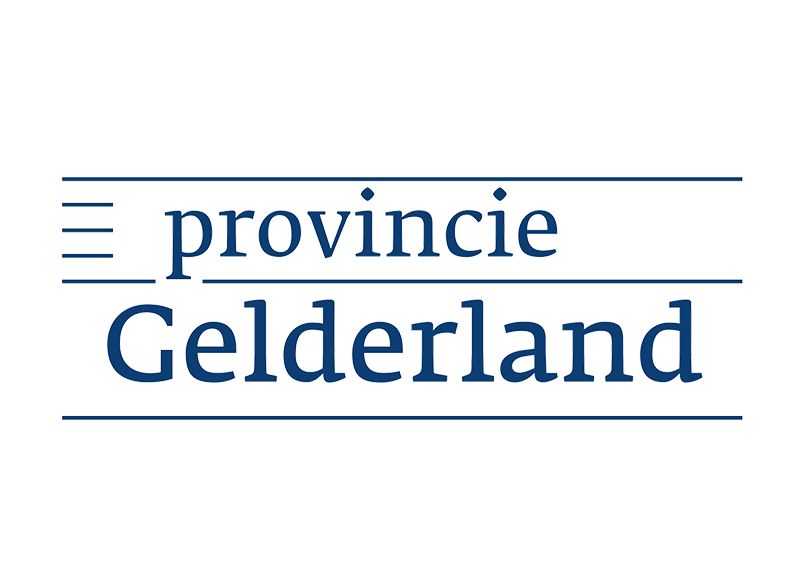Photo’s by Dick Boschloo
Together towards a democratic Food System
Recap Food Anders Conference June 10 and 11, 2022
On June 10 and 11 it finally happened: the 3rd Food Anders Conference. We were in Wageningen with a total of about 400 people “Together towards a democratic food system”. In more than 50 different workshops people met and shared knowledge about how agroecology in the Netherlands can finally get the place it deserves, what food sovereignty looks like in practice, how we can show solidarity with the global South and what is needed for a fair and sustainable trade and agriculture policy.
Check out the Program booklet here
Various speakers inspired us during the plenary programme
Arthur Mol, rector magnificus of the WUR already sees consensus on a number of points in the agricultural transition: for example, to use less animal protein, the importance of the soil and to move towards regional food systems. He sees the initiatives that connect themselves in Voedsel Anders as precursors and inspiration for the future and he welcomes us warmly to the WUR.


Photo’s by Dick Boschloo
Jaap Tielbeke, of the Groene Amsterdammer then explained why a better environment does not start with yourself, but is a system question. To change that system, we also need to make ourselves heard as a collective and hold those responsible for the climate problem accountable. The climate lawsuit against the state of the Netherlands is such an example and more will follow to hold the government accountable as guardian of the collective resources. Roos Saat tells how Extinction Rebellion is working on this for agriculture, with actions aimed at the big earners who maintain the current destructive agricultural system. John Arink, a biodynamic dairy farmer from the Achterhoek region and involved in Caring Farmers, explains how the current agricultural model has been disastrous for farmers. On his farm he has chosen not to depend on agribusiness. They feed the cows from their own land and arrange their own sales. The transition that agriculture must make is largely an energy transition. (He refers to Meino Smit, who calculated that a farmer in the 1950s produced more kiloJoules than a farmer around 2010). Alies Fernhout of Food Park Amsterdamlistened to the importance of local political work: ‘citizens are much further ahead than politicians. Politicians have squandered the land on the market, so Amsterdam now opts for a blockbuster instead of organic food production on its own ground. Anna Wissman, Food Policy Council Movement, and ILS researcher from Germany talks about how important it is for the food movement to also change the framing. We, farmers, activists and consumers should ask for serious food policy instead of leaving it to the market: after all, we are citizens and not just consumers. Food policy is not just about agriculture, it is overarching and is about our culture, the social system and how we live.

Photo’s by Dick Boschloo
After these insights on system change and the importance of collective power, Béatrice Gorez, (Coalition for Fair Fisheries Arrangements) and Edie Mukiibi ( Slow Food Uganda and VP Slow Food International’) shared their views on what it takes for a more democratic and decolonial food system. They showed how disastrous the Western way of fishing and trading is for the food system in the Global South and self-development. Small-scale fisheries in Africa are an important source of food for local people, but are increasingly being pushed back by large industrial fisheries. One result of this is that farmed salmon from Norway are fed African fishmeal, turning 10 kilograms of African food into 1 kilogram of salmon. One message is to stop consuming these fish.
Both point out that our current food system is still based on colonial structures. Before colonization, there was no hunger. Plantation agriculture and ‘free’ trade still leads to farmers in Africa and the rest of the world now producing food for big corporations rather than for their own communities. Edie therefore works with Slow Food to create resilient local communities by starting school gardens and community gardens (10.000 gardens). In addition, Slow Food supports these communities to gain political influence. So that access to land and water is free for local communities and land-grabbing can be prevented. In addition, fair trade agreements are important. When asked how the Dutch Food Movement can support these organizations, Béatrice’s answer is that we can, for example, influence fair bilateral agreements between the Netherlands and the EU, and Southern countries. Edie also emphasized that it is important to build alliances between North and South, as a food movement, for example through Slow Food Netherlands. In addition, we need to find ways to ensure that the African voice is also heard in Europe by lobbying together for a democratic and just system.



Photo’s by Dick Boschloo
On Saturday the 2nd day of the conference started with the Grondrede , a compelling Frisian creation about our relationship with the Earth. Afterwards Veerle Slegers (Food Anders) talked to Dee Woods from London involved with Food Ethics Council and Granville Community Kitchen. Dee Woods is a passionate chef and community builder and has been advocating for good food for all in an inclusive food system for years. She made us all feel how privileged we often are. What it’s like to be seen as “different” from an early age and how our system excludes and exploits people to this day. How poverty works and that white people really are a minority in this world – but often don’t realize it themselves. Together towards a democratic food system is essentially about how we free ourselves from the shackles in solidarity. So we need to work together to make the system inclusive and put the connection between people at the heart of it: we are connected to each other. She showed that transition is also accompanied by emotion: sadness and anger about where we are now. And that transitioning the system is also as a personal processing process: getting free from the trauma and from the many ways we have been dehumanized. Realizing that we are one and with the people around us, rooted in our community taking steps together that we know need to be done.
Closing stage: continuing to work together on a democratic food system

Photo’s by Dick Boschloo
On the closing stage of the conference, a large number of parties expressed their commitment to (continue to) work together for a sustainable and democratic food system.
The updated Food Otherwise Manifesto makes clear what kind of food system we want. It already has a lot of organizations under it. We want: equitable and sustainable food systems grounded in the region, and for us that means:
- responsible management of soils, landscape, biodiversity and water here and elsewhere
- fair prices and autonomy for farmers and fishermen
- healthy food for all
- access to land for agroecology; access to water for local fishermen
- reconnection with the environment and with each other
- food sovereignty within trade, agriculture and fisheries policies
- everyone has a voice in the food system
- regional systems; – communities
Providing farmers perspective
To farm well, perspective is needed. Some (representatives) tell what they have on the agenda to achieve this perspective:

Photo’s by Dick Boschloo
Klarien Klingen (Farmer and Federatie van Agro-ecologische Boeren): “Agro-ecological farmers and citizens know that they have to challenge existing power structures while building alternatives. They know that solidarity compensation is important, that land must be taken out of the market and into the commons. That biodiversity, soil, animals and people are central. That’s why we work with action groups like Extinction Rebellion and Greenpeace, because we know we need each other.”
Willem Lageweg (Transitiecoalitie Voedsel and Boerenraad): “Together with many organizations, we have called on the two responsible ministers, Staghouwer and Van der Wal, and on the Lower House to offer farmers a long-term perspective and to give them confidence and space for their own transition. We want to create, together with reliable parties, a program where there is space in between, space to think about, and to develop a long-term perspective for farmers who are stuck, who do not know how, who suffer from peer pressure, whose families do not cooperate, who feel intimidated and who are talked down to the wrong way by suppliers. We ask the government to give resources to this program so that sustainability can take place on a larger scale.”
Willem and Klarien together recommend that we read Meino Smit’s new book: “Towards sustainable agriculture in 2040, a new perspective”. This book exposes the fact that our current agricultural system uses more energy than it extracts and describes how we can produce food in a sustainable way.
Guus Geurts (Landbouwcoalitie voor Rechtvaardige Handel): “The Agriculture Coalition is a partnership between farmer and civil society agricultural organizations: Agractie, BD-Vereniging, DDB, NAV, NMV and Platform Aarde, Boer, Consument. When farmers regain a fair price for their product, it will be much easier to meet higher environmental and animal welfare standards. A drastically different EU trade and agricultural policy is therefore crucial. In fact, the colonial armies of the past have been replaced by today’s free trade agreements, with the same goal: access to new resources and new markets.
Neoliberal policies since the 1980s have made farmers produce more and more for world market prices, abolishing milk quotas on top of that was a big mistake. If this is corrected, the CAP money can be put to more useful use in green social services and many more farmers will be able to participate in the necessary transition. So: use the nitrogen money mainly for extensification, so that as many family farms as possible remain.”
What is our implementation agenda?
Restoring connection at the base
Time and again the importance of the connection with the basis came back in the workshops: a healthy soil is the basis of our own health, but the basis also lies in our own environment: our community. There – with the people around us – we find the strength to fight against injustice. Here is also the bedrock for learning to deal with change on a personal and collective level: letting go of privileges, dealing with shame and guilt and becoming free of patriarchal thinking. We are all part of the solution – in our own place and our own way. Together we can muster the courage and strength to reform our culture and our institutions.
The first point on the implementation agenda to all participants is therefore to keep doing what you are already doing, and to be proud of it. So much is already happening in so many places! We must especially keep that up and also let our voices be heard more together, so that policies are adjusted in the right direction.
In the coming weeks more and more reports of workshops will appear on our website telling about the pioneers and their examples, their dilemmas and what is needed to move forward. It will say what opportunities there are to work together on healthy soil, care for biodiversity and climate and where we can ’turn the tables’ in the system. How to organize sustainable access and control for farmers and local communities over land, water, forests and genetic diversity of livestock and seeds. The great diversity of the workshop, grouped into six themes, provides a good summary of the various discussions that we are currently holding in the Netherlands.
Henk Renting ( Voedsel Anders core team and Aeres Hogeschool) gave a brief review of the 16 workshops on regional food systems: there is a lot of dynamism going on here: farmers connecting more regionally, citizens taking more of their own role in the food system and building up at the area level. Food cooperatives, cooperative stores, buying land together, investing in new businesses (e.g. Lenteland, Herenboeren, Land of Us and CSAs). An important lesson is that you see new cooperative structures emerging at these different scale levels. The collective power is being harnessed in all these connections and the food system is being reshaped.
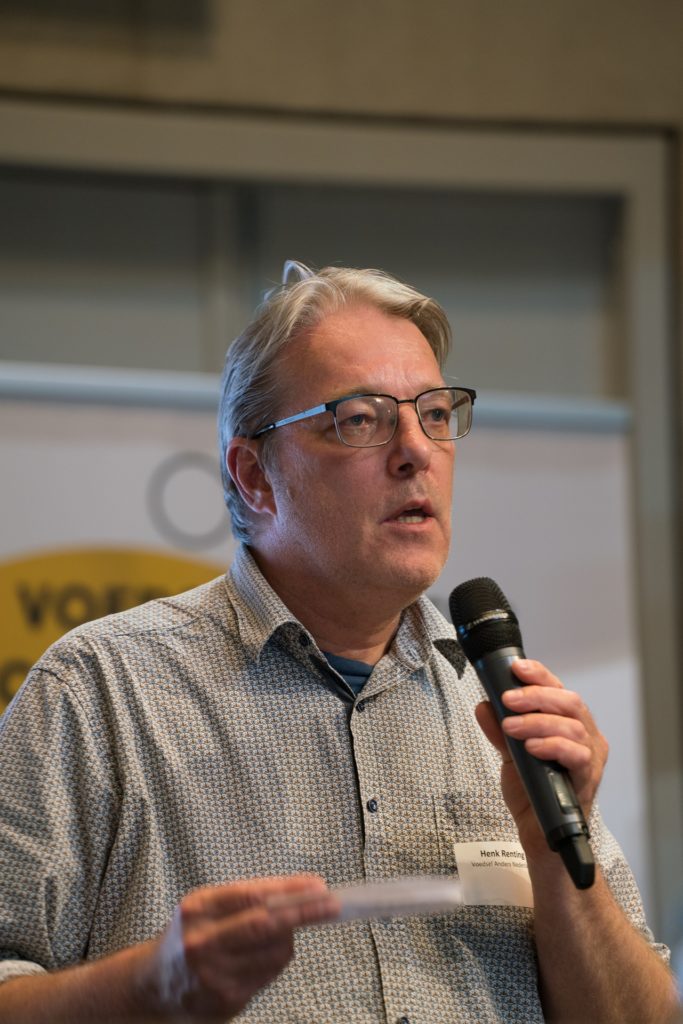


Photo’s by Dick Boschloo
René de Bruin ( Voedsel Anders core team) emphasized the need to eat differently: if you eat from your regional ecosystem, it is good for the climate, our health and creates a new balance with the amount of livestock in an area. To make that happen, we need to see food more as a public amenity, not left to the market alone. The food movement must become more inclusive and we must also try to reach people with small wallets. Finally, structural changes in the food environment will have to take place.
Tjerk Dalhuisen (Voedsel Anders core team) gave a brief impression of the workshops on soil, biodiversity and climate. We all feel the great urgency of stimulating healthy soil, sharply reducing the use of pesticides and encouraging biodiversity. We must include farmers in this and ensure that they are rewarded with a good price or subsidies. New genetic engineering is a new problem and not a solution. It makes the model even more intensive and farmers even more dependent on inputs. Deregulation leads to loss of choice for farmer and consumer.
Laura van Oers (Voedsel Anders core team) spoke on behalf of the theme of access to land and water, in which we angered about the challenges for (new) agroecological farmers and local fishermen as well as explored solution directions for greater autonomy and local self-management, such as the growing commons movement that takes natural resources out of the market or public domain to bring them back under shared ownership. She concludes: access to land and water requires not so much innovations within the capitalist system, but a transformation of current capitalist structures and practices, which perpetuate unequal and discriminatory (global) power relations/relationships and globally exclude or disadvantage small-scale sustainable fishers and farmers.
Shaping the food transition together? Different roles in a growing movement
De voedselbeweging heeft zich de afgelopen jaren ontwikkeld tot een zwerm van organisaties eIn recent years, the food movement has evolved into a slew of organizations and individuals building toward this new reality.


Photo’s by Dick Boschloo
Jelleke de Nooij van Tol (De Transitiemotor, Het Nieuwe Netwerk) outlined how we are now at a tipping point. There really is a breakthrough for the transition in 2022 and 2023. There are so many organizations that are already doing things differently, that are based on other values such as working together, living within the carrying capacity of the earth, justice and sharing. These organizations are acting more and more together, forming a fist together. They make themselves heard about what is happening and what needs to be done or they organize themselves so that they are a clear point of contact for politicians. Different parts of this movement focus on different parts of the work that needs to be done: on the one hand there are things in the system that need to be broken down, and on the other hand the emerging movement that needs to grow stronger. Everyone in the movement can contribute to this: by working from your own passion and qualities.
If we make sure we build smartly on each other’s conferences then we will take the central themes one step further each time. September 9 is the next big conference where we can take steps again.
Pelle Berting (Greenpeace) affirms these different roles. He emphasizes the importance of the disruptive movement: “If we look at what the big companies are doing and what the financial sector is financing, we need to build the capacity as a movement to challenge and transform the centered power to how we want it to be.” Greenpeace is happy to empower farmers and producers with its knowledge to be in the news as a spokesperson at the right time, so that the story of change is well presented and decisions are made in The Hague for the better. In addition to mobilization and asset building, Greenpeace will build local and regional collaborations. Ensuring that there is meeting and awareness can grow in a wider group.

Photo’s by Dick Boschloo
Wim Moyaert (from Flanders, Boerenforum) recognizes the situation in agriculture, which in Flanders is similar to the Netherlands. It is important to also connect across borders with other movements and organizations that stand up for peasant agriculture and the necessary change in the entire food chain up to and including consumption.
Dee Woods (from London) liked that everyone was so open and honest, and willing to listen to the need to question capitalism and free ourselves from the paradigm of an industrial global food system that feeds all mouths. She appreciated that we dived deep into the matter and invited us to (continue to) ‘unlearn’ – decolonize ourselves – and collectively imagine and embody an inclusive, resilient and just food system. The movement in the Netherlands is still too white. Stop expecting people to just join. When we talk about a just and sustainable food system, we need to reach out, listen more carefully. With her heart-warming smile she concludes: shall I say it? – another world is possible!
Anna Wisman (Food Policy Council movement and ILS researcher from Germany) saw many similarities – but was surprised by the amount of different organizations in the Netherlands – such a small country and maybe a bit overorganized? She really appreciated the Food Different Conference, Germany has no such thing and she has been looking forward to the Dutch edition for years. Building the movement further is very valuable: to know from each other what you are working on and to use the different roles.

